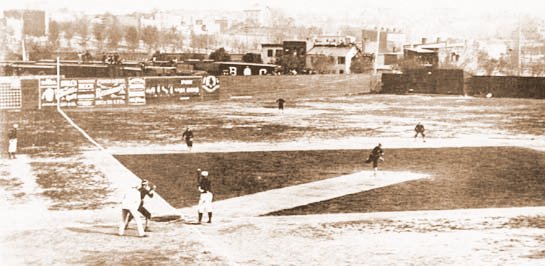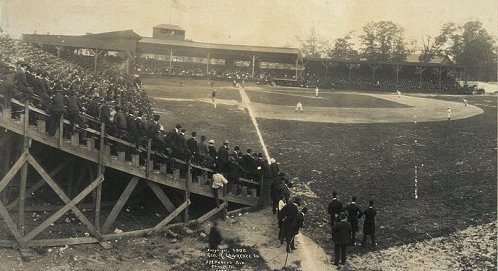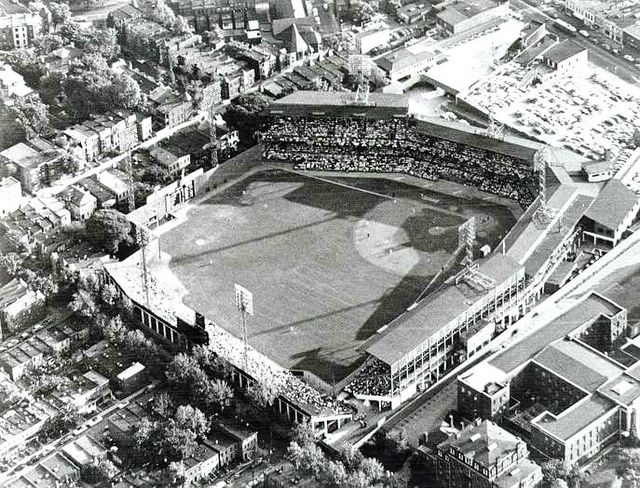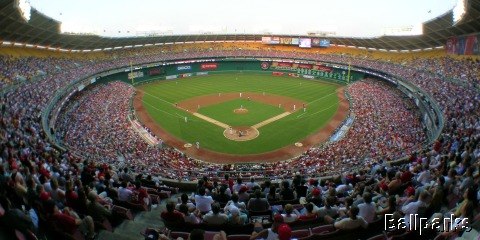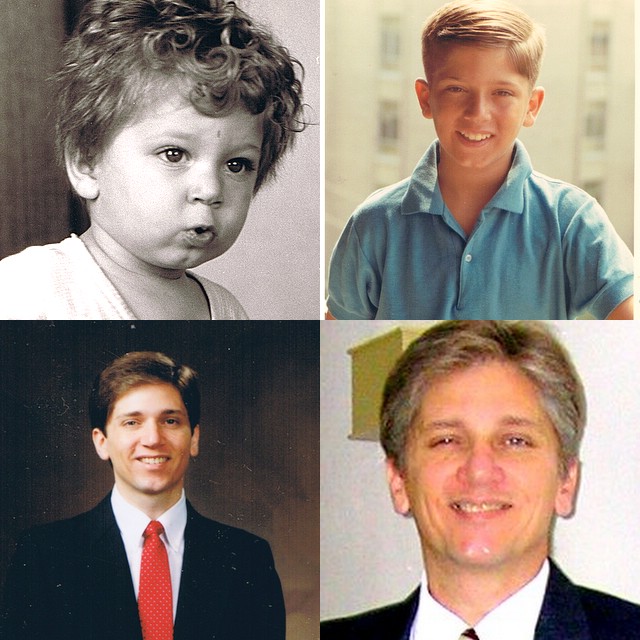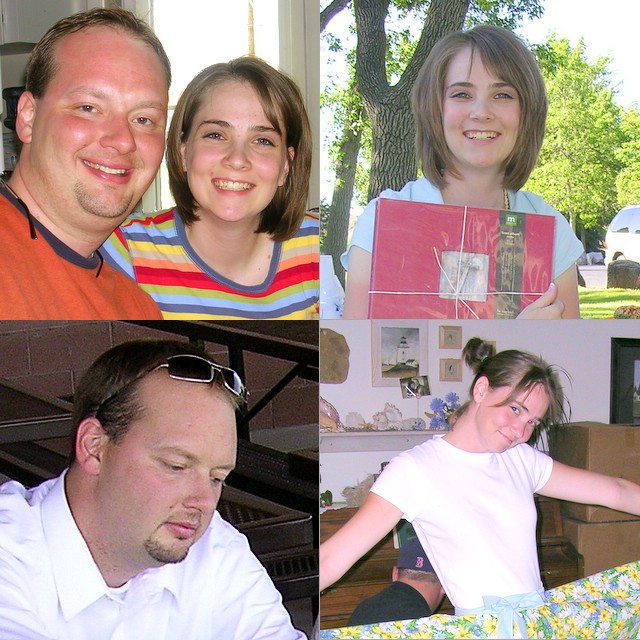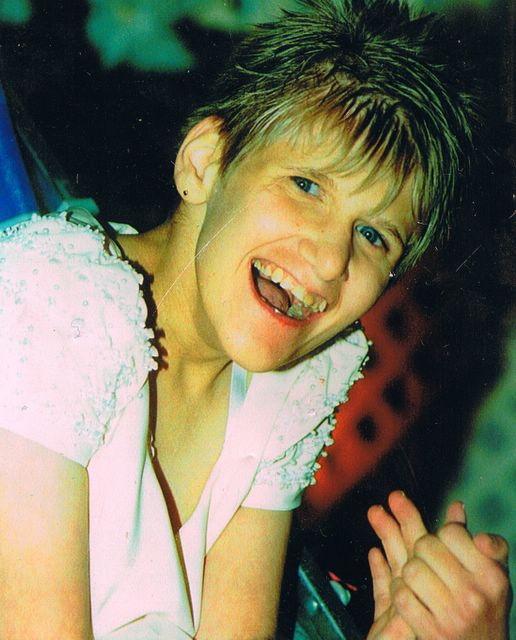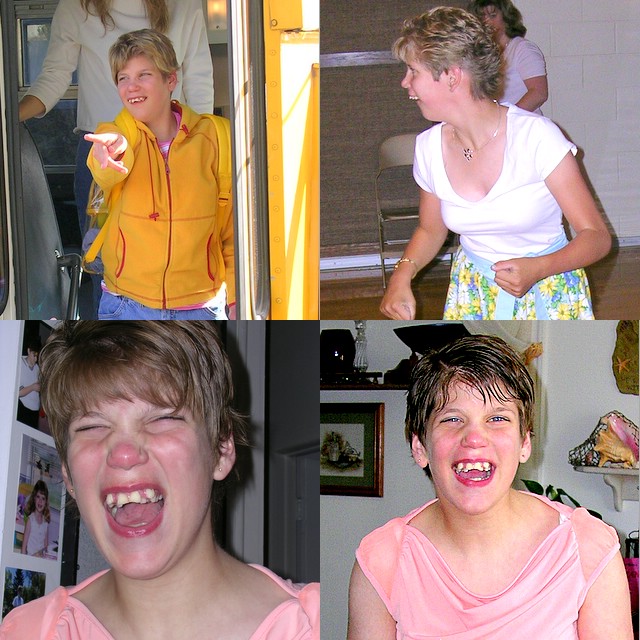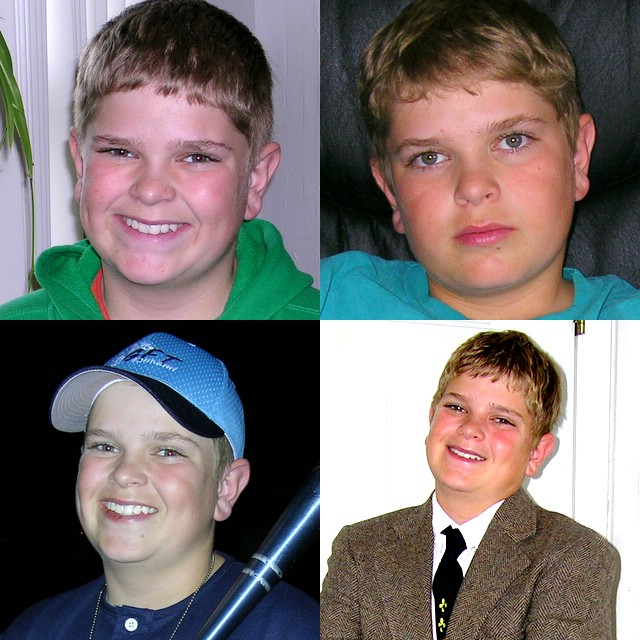NATS DIGGING DEEP HOLE, MAY BE HARD TO GET OUT OF WITH 9-2 LOSS TO CARDINALS
 [May 1st] -- The closest thing in Sunday's game between the Nationals and the St. Louis Cardinals was this play at first. Another loss, another big loss, 9-2.
[May 1st] -- The closest thing in Sunday's game between the Nationals and the St. Louis Cardinals was this play at first. Another loss, another big loss, 9-2.
Zach Day looked great for four innings, but that nasty 5th took him out of the game. That's standard practice for so-so pitchers. They don't get bombed in each frame. No, they look good for four, perhaps even five innings. Just when you think they're going to pitch a great game, the floodgates open and really bad things start to happen. So what is the difference between the Rockies' Zach Day and the Nationals' Zach Day? Apparently, just the color of the uniform.
The first four players in the Nats' lineup, Alfonso Soriano, Jose Vidro, Nick Johnson and Jose Guillen, went a combined 0-14. That's not good.
On a positive note, Ryan Zimmerman got two more hits and hit a long home run off of Cardinals' starter Jeff Suppan, his fourth of the year, and the rookie now has 17 RBI's for the season. How can a guy with a .240ish batting average have so many RBI's? Because the guy hitting in front of him, Jose Guillen, is leaving them all on the bases. But that's okay; right now, I'd rather have Zimmerman look good in the box score than Guillen. Zimmerman doesn't think he's worth $10 million per year.
No rest for the weary, as the Nationals move on to play the first place Mets again. I would normally insert some superlative here to help suggest that the Nats will gave a great chance of winning the game, but you know as well as I do that Ramon Ortiz is starting for the Nationals.
Crap.
REBIRTH
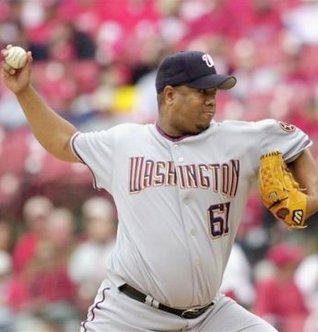 [April 30th] -- Sometimes, your team loses a game, and it's okay. Such a game occurred Saturday in St. Louis, where the Nationals lost to the Cardinals, 2-1.
[April 30th] -- Sometimes, your team loses a game, and it's okay. Such a game occurred Saturday in St. Louis, where the Nationals lost to the Cardinals, 2-1.
The Washington Nationals, fresh off an 8-3 beating of the Cardinals, faced last year's Cy Young award winner in Chris Carpenter, as well as all-world first baseman Albert Pujols. All the Nats had going for them was an pudgy pitcher with an ERA around 7.00.
What a game.
Livan Hernandez didn't keep up with Carpenter, he blew past him. In eight innings, Livan allowed only three hits and one run, lowering his ERA to 5.49 for the year. Jose Guillen powered a long home run for Washington's only run of the game.
Jon Rauch took over in the bottom of the 8th, and suffered the misfortune of facing Pujols, one home run short of setting the all-time MLB record for most homers in April with 14. You knew, I mean you just knew, that it was going to happen. No power on Earth was going to keep that ball in the ball park. It was kismet.
So, Cy Young (or should I say his most recent reincarnation) pitched and Albert Pujols hit, and the Nationals lost. This was just one of those games where you have to give the opposition a round of applause. The Nats outplayed them for most of the game, and showed that they are capable of beating anyone. Livan Hernandez showed that all those innings over the years hasn't blown up his arm (though another similar start against the Marlins next week is a must) and that perhaps we can again count on him.
There are losses, and then there are losses. This one didn't hurt too much.
PROOF THAT ON ANY GIVEN FRIDAY ....
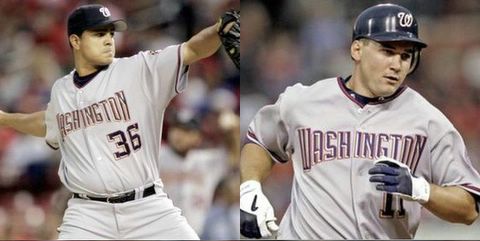 [April 29th] -- One win does not entirely wipe out the bad memories of a six game losing streak, but it helps. Especially when the win comes against the mighty St. Louis Cardinals. Nick Johnson and Ryan Zimmerman each hit two-run home runs in the first inning, and Tony Armas Jr. had another quality start, allowing only two runs in six innings, allowing four hits while striking out five; his ERA is now a solid 2.76.
[April 29th] -- One win does not entirely wipe out the bad memories of a six game losing streak, but it helps. Especially when the win comes against the mighty St. Louis Cardinals. Nick Johnson and Ryan Zimmerman each hit two-run home runs in the first inning, and Tony Armas Jr. had another quality start, allowing only two runs in six innings, allowing four hits while striking out five; his ERA is now a solid 2.76.
A good game, a good win, against a good team.
Wow. Tony Armas. Who would have thought? Last winter, the Nationals had written off the oft-injured right-hander to free-agency. He only got one nibble, however, and that was from the Colorado Rockies, not exactly the place to rebuild your career if you're a pitcher. So he returned to Washington, signing a one-year contract. If he keeps pitching this way (the way scouts always thought he could), he'll earn a nice contract this fall, and he'll deserve it. And (finally) the Nationals will be in a position to provide it.
Ryan Zimmerman continues to learn from his mistakes. Though he's still striking out like a rookie (on pace to whiff 180+ times this year), he's not embarrassing himself on those outside changeups and curve balls as often. He's now on track to hit 25 homers and drive in 95 runs. Will he reach those numbers? Maybe. Perhaps he'll exceed them. Mike Shannon, the former 3rd baseman who now broadcasts the Cardinals' games, was stunned by Zimmerman's great catch of Yadier Molina's liner down the line and then his quick action to double off John Rodriguez at first. "Whoa baby!" exclaimed Shannon (I lived in St. Louis for three years, and I gotta tell you, I listened to the Cardinals' games to hear Jack Buck, not Mike Shannon)
Anyone missing Cristian Guzman? Royce Clayton, a minor league signee earlier this year, got two more hits Friday night and is now hitting .269 for the year. Clayton isn't a "plus" for the Nationals; that is, he doesn't do things to help the team win. Rather, he doesn't do the stupid things that cause the team to lose. And that, my friends, is major upgrade from what we had last year.
How is RFK effecting the Nationals so far this year? They are hitting only .229 at home, but .271 on the road. Is it a mind-set, or deep power alleys? Both? I was very disturbed when team president Tony Taveres said last winter that the team was not going to move in the fences, and that his team's hitters would just have to "deal with it." If the fences were placed where the distances markers indicated, then I'd be with him 100%. But when a 380 foot power alley is in reality 395 feet, then something needs to be done. I think bringing in the fence 10 feet from alley to alley would still leave RFK with the deepest left center to right center distances in the majors. I was around during the original incarnation of RFK, and the park was considered a home run park, especially when the city began to warm under the summer's sun. Frank Howard hit 36-44-48-44 homers from 1967 through 1971, and Mike Epstein whacked 30 in '69. With fairs distances, the park will give up it's share of homers.
Livan goes against Cy Young award winner Chris Carpenter in a rare Saturday day-game. Because Hernandez is long-due for a solid game, and because the Nationals shouldn't be able to beat Carpenter, I think they will.
We'll see.
NATS MINOR LEAGUE PITCHER OF THE YEAR A MAJOR SUCCESS
 [April 28th] -- First the good stuff. Well, the good thing. If Ryan Zimmerman doesn't make his first error of the year on a ball in the dirt (a ball that Nick Johnson catches 99 times out of 100), rookie Mike O'Connor would have pitched shutout ball in his first outing in the "bigs." Instead, Jim Edmonds was able to get a swing in that first inning, and walloped O'Connor's pitched deep into the rightfield seats. In total, he pitched five strong innings, giving up three hits and four walks, but allowing no earned runs. An excellent job against a lineup full of studs.
[April 28th] -- First the good stuff. Well, the good thing. If Ryan Zimmerman doesn't make his first error of the year on a ball in the dirt (a ball that Nick Johnson catches 99 times out of 100), rookie Mike O'Connor would have pitched shutout ball in his first outing in the "bigs." Instead, Jim Edmonds was able to get a swing in that first inning, and walloped O'Connor's pitched deep into the rightfield seats. In total, he pitched five strong innings, giving up three hits and four walks, but allowing no earned runs. An excellent job against a lineup full of studs.
O'Connor reminded me of a young Billy Traber, but with a much better curve ball. O'Connor never threw a "fast" fast ball, but he sure buckled a few knees, especially the left handers. His four walks were a bit high, but I think it most of them can be chalked up to nervousness. Heck, if I had to pitch to Albert Pujols when I was a kid, I probably would have peed in my pants.
Good job, Mike.
Okay, the bad stuff. It seems as though the team is just going through the motions without any real desire to win. Zimmerman's bad throw was excusable, especially because it was a very catchable ball. But he also dropped a pop foul at the dugout fence.
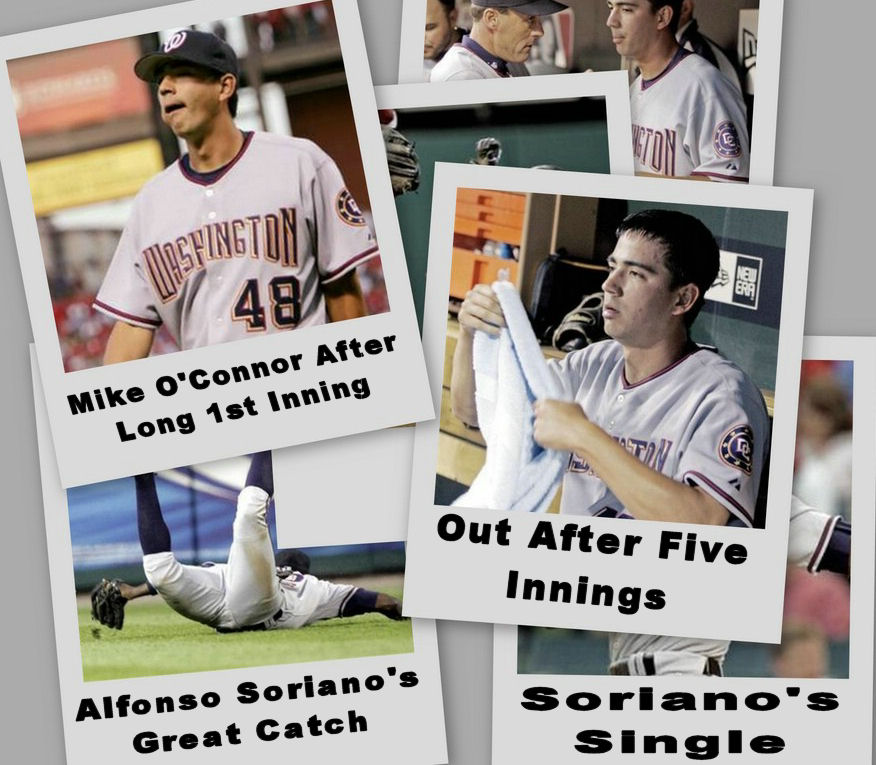 Ryan Church meandered under a ball at the warning track, but a lazy glove allowed the ball to pop back out and bounce off the fence. The player's heads seem always down, like they are always ready for something bad to happen, and it usually does.
Ryan Church meandered under a ball at the warning track, but a lazy glove allowed the ball to pop back out and bounce off the fence. The player's heads seem always down, like they are always ready for something bad to happen, and it usually does.
On a lucky note, Jose Guillen threw out a runner at home plate, which was great, except he was safe. Really safe.
The longer that Bud Selig waits to announce The Lerner family as the team's new owner (I'm going with that assumption until he tells me otherwise), the worse this team is going to play. I mean, it's hard watching them play night after night, with them knowing that their world is about to be turned upside down at any moment. Bob DuPuy said that the new ownership will take over day-to-day control of the team in June. That's fine, but the players need the name. They need the name now. Their sanity depends on it.
It looks like we're going to measure success this year in "line items" in the box score; not so much that we won, but that we looked good while losing. And that's fine. Big changes are a' brewing. I can wade through the bad times.
They won't last long.
CARDS STILL SUPER, BUT HOW?
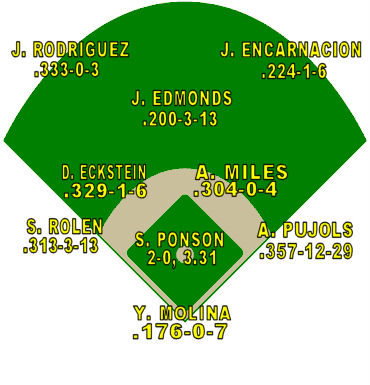 [April 27th] -- The Cardinals, the next team in line to dominate the Washington Nationals, have a 14-7 record and continues to play at a level above most of the teams in the National League. But a quick look at their starters suggests that they are doing more in 2006 with less.
[April 27th] -- The Cardinals, the next team in line to dominate the Washington Nationals, have a 14-7 record and continues to play at a level above most of the teams in the National League. But a quick look at their starters suggests that they are doing more in 2006 with less.
Oh sure, Albert Pujols and Scott Rolen are lighting up the scoreboard, and Aaron Miles and David Eckstein are singling up a storm, but that's about it. Jim Edmonds, soon to be 36, isn't providing very much offense. Juan Encarnacion, a free-agent pickup from the Marlins, is off to a slow start at .224-1-6. Catcher Yadier Molina, a veteran of two major league campaigns at only 22, is batting only .176. John Rodriguez has replaced Reggie Sanders in left, and is hitting well enough, but without Sanders' authoritative bat.
Pitching, however, is a different story. The Nationals face Sidney Ponson tonight. Ponson, 29, is the Cardinals' #5 starter, and has a 2-0, 3.31 ERA --- talk about depth!
If I had to choose eight guys to make up the best team possible from between the Cardinals and Nats' players, the team would look like this:
- 1B: Albert Pujols
- 2B: Jose Vidro
- SS: David Eckstein
- 3B: Ryan Zimmerman
- LF: Alfonso Soriano
- CF: Ryan Church
- RF: Jose Guillen
- C: Brian Schneider
Now, before you start dogging on me, I chose Zimmerman at third and Church in center because those two players are just beginning their careers, and Rolen and Edmonds are at the very end of theirs. Those two aside, the other choices are fairly easy. The Nats win six spots, the Cardinals only two. So why then is the Nationals 7-14 and the Cardinals 14-7? Pitching, my brother: pitching.
Of the Cardinals starting five (Chris Carpenter, Mark Mulder, Jeff Suppan, Jason Marquis and Ponson), Only John Patterson would be a shoe-in, taking Suppan's spot. Right now, considering Livan Hernandez's weight, innings pitched, and generally bad play so far this year, I'm not certain that he could replace Marquis, who at 3-1, 3.55, is both younger, and at least at this point, better.
Part of the Cardinals' success is their winning attitude that dates back to the 1930's and the "Gashouse Gang led by Dizzy Dean and Ducky Medwick." There hasn't been a decade where the Cardinals haven't made a serious run at a World Series title. They expect to win. The Nationals, fresh off the many fiascos this off-season, expect to lose.
What does this all mean? Because the Nats have no chance to win tonight, they will. That's how they seem to work.
ZIMMERMAN LAYING SOLID FOUNDATION
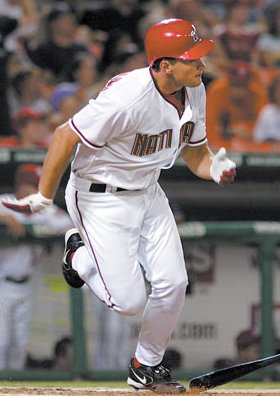 [April 27th] -- If, on opening day, your fairy God-mother had said to you, "With a wave of my magic wand, I can guarantee you that your rookie third-baseman, Ryan Zimmerman, would have these stats for 2006: .241 batting average, 143 hits, 30 doubles, a triple, 16 homers, 105 rbi's, 82 walks and 180 strikeouts" would you have said, "Go ahead, girl, wave that wand?" Probably.
[April 27th] -- If, on opening day, your fairy God-mother had said to you, "With a wave of my magic wand, I can guarantee you that your rookie third-baseman, Ryan Zimmerman, would have these stats for 2006: .241 batting average, 143 hits, 30 doubles, a triple, 16 homers, 105 rbi's, 82 walks and 180 strikeouts" would you have said, "Go ahead, girl, wave that wand?" Probably.
That's a pretty good rookie season for a 21 year old kid who was just a year removed from college. Sure, the 180 k's are very high, but he's been learning with each and every one of them. His batting average would be low, but the 105 rbi's more than make up for that.
Twenty-one games into the 2006 season, that's exactly the pace Zimmerman is on. My guess is that he'll end up with a higher average, maybe .250 or .260, and a few less rbi's, perhaps 80 or so, but the rest of the numbers look about right.
Sure, he looks over-matched at times, but at other times he hits Billy Wagner fast balls for home runs. He's a work in progress. His defense, which was horrid this spring (seven errors), is once again his signature talent. He's already had a #3 and a #5 ESPN Web-Gem. That catch he made over-his-shoulder a few games ago is perhaps the finest play by a 3rd baseman going out that I've ever seen.
And he's twenty-one.
The kid is definantly as advertised: stud with the glove, solid with the bat. What does the future hold for Ryan Zimmerman? I think he's going to put up Chipper Jones type numbers for years to come, but with a glove more like that of Ken McMullen (hey youngins, Kenny McMullen was the second best defensive 3rd baseman in the A.L. during his years with the Senators. You know who the first was ..).
For all his faults, at least Jim Bowden didn't screw up the '05 draft.
NATS & THE TEE SET: ONE HIT WONDERS
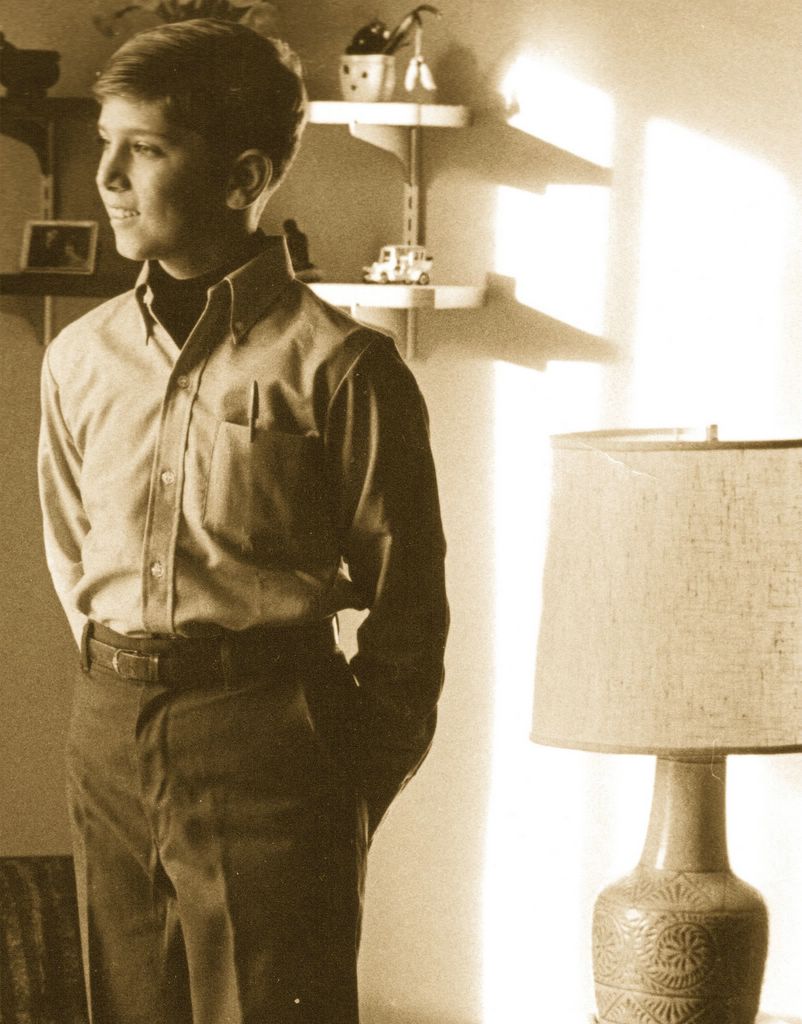 [April 26th] -- Okay, okay. For you young Nationals' fans, I have to explain the headline. This will probably be the most interesting part of this post, considering what I have to work with baseball-wise.
[April 26th] -- Okay, okay. For you young Nationals' fans, I have to explain the headline. This will probably be the most interesting part of this post, considering what I have to work with baseball-wise.
I woke up at 6:00 a.m. the first day of my freshman year of high school. I was scared to death and so excited that I couldn't sleep any more. I took a shower and got dressed (I bought a brand new dickey for that first day -- leave a comment if you want to know what that is!), ate a bowl of cereal, and still had an hour before I had to leave for the bus stop. My dad snapped this picture of my official "first day" and then headed off to work.
As soon as he got on the elevator, I latched the front door and turned on Dad's stereo, a stereo I wasn't allowed to listen to rock and roll on. Hey, I was a freshman. I carefully marked the analog dial with a pencil to show me the station he had it on (WMAL 63 -- always) and slowly turned the dial until I reached 1340, WEAM radio. "The WEAM team." A.M. radio that rocked! There was no rock and roll on FM back then -- well, not top 40 anyway. I had to listen to a Koons Ford commercial before the D.J. played his first song of the morning. He said something like: "Hey kids, it's 6:45 -- first day of school for most of you listening. Cheer up ... only 9 months until school's out ...ha ha ha [music begins] here's a new song from a group you're going to hear a lot about ... They're called Tee Set and this, kiddies, is Ma Belle Amie!"
The song made the hairs on the back of my neck stand up -- I loved it! The singer's deep voice, his fluency in both English and French, the simple lyrics, I was hooked. WEAM and WEEL played that song 10 times a day for a month, and then, just as quickly as it came, it went away.
Of course, The Tee Set, like the Nationals today, was a one-hit wonder.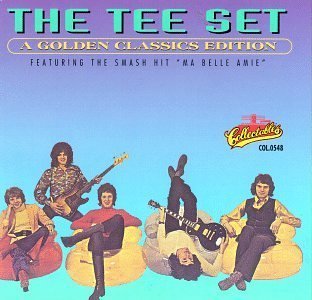 I never heard from them again. But I have a cassette with the song on it, and I listen to it at least once a week. "My Belle Amie" (this site has a 30 second preview of the song) is like a portal through time. It takes me back to a time in my life when my heart worked and I didn't, a time when I still had parents, a time when I could become anything I wanted. I have no regrets, but, truth be told, I could have done a few things a little different.
I never heard from them again. But I have a cassette with the song on it, and I listen to it at least once a week. "My Belle Amie" (this site has a 30 second preview of the song) is like a portal through time. It takes me back to a time in my life when my heart worked and I didn't, a time when I still had parents, a time when I could become anything I wanted. I have no regrets, but, truth be told, I could have done a few things a little different.
Oh well.
On to the Nationals. One hit. Ramon Ortiz sucked again. End of story. With each passing game, the Nationals are showing me that they are going to be a 70-73 win team, with some bright spots, but with many black holes as well. Sooner or later, the new management is going to decide to play the kids and prepare for next season, the first full year with a real owner.
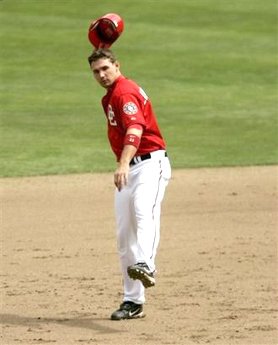 And I'm cool with that. I mean, why keep pitching Ramon Ortiz every fifth game if he's going to give us no opportunity to win.
And I'm cool with that. I mean, why keep pitching Ramon Ortiz every fifth game if he's going to give us no opportunity to win.
Maybe Jon Rauch is the answer, maybe not. Let's find out now.
I still love 'em, perhaps even more than last year. As a parent of six kids, I can tell you that it's easy to love your "perfect" kids, and harder to love the ones who give you a problem. That's why you love them even harder.
This season, I'm going to be loving the Nationals even harder.
IT'S LERNER! WELL, MAYBE
 [April 26th] -- Update: Now Major League Baseball and Jeff Smulyan are saying that Channel 9's report about the Lerners getting the team are false. Don't bet on it. MLB likes to control it's own news reporting, and probably will now wait a few before announcing that the Lerners are the owners. Don't fret; it's just politics.
[April 26th] -- Update: Now Major League Baseball and Jeff Smulyan are saying that Channel 9's report about the Lerners getting the team are false. Don't bet on it. MLB likes to control it's own news reporting, and probably will now wait a few before announcing that the Lerners are the owners. Don't fret; it's just politics.
Channel 9 seems to be the first with the announcement: Major League Baseball will "allow" the Lerner group to purchase the Washington Nationals for $450 million dollars.
It's my guess that it was the Lerner's all along. All the love and attention given to the other groups was Bud Selig's way of forcing the Lerner's to do what he wanted; that is, to name Stan Kasten as president and increase his minority investment.
I believe that Jeff Smulyan, a close friend to White Sox owner Jerry Reisendorf, went through this process with an eye to being the "the guy" when the next team comes available. Can't you just see Bud calling a current owner with a desire to sell and saying, "I've got this guy, Smulyan, who almost got the Nationals. He's been vetted and he's ready to be an owner. Talk to him." As to Malek, I think he was always a distant second to Lerner.
Now what? MLB officials said that they would try to get the Lerner's on board in just a matter of a few weeks. This spells the end of Tony Taveres' reign as president, which is no big deal since Taveres has repeatedly said he wanted to go home. Just how long with Kasten keep Bowden? Hours? Days? Weeks? That will be the interesting question throughout the summer.
So, the Nationals now have an owner, they now have a new stadium, and they still have a season to complete before big changes are made.
Or do they? Stay tuned.
ANOTHER COMEBACK FALLS SHORT
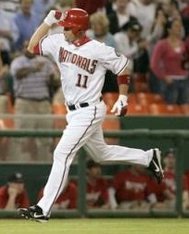 [April 26th] -- The Washington Nationals are playing just well enough to lose.
[April 26th] -- The Washington Nationals are playing just well enough to lose.
Don't get me wrong, I'm not mad, I'm not frustrated, I'm not even concerned with the team's start this season. Most of us prognosticator types predicted a 70-75 win season, and that's about where they are headed.
Did anyone else feel sorry for Alfonso Soriano last night? He is a proud man, an excellent athlete, being asked to learn a new position in front of major league crowds. That ball hit at him last night would have been difficult for a seasoned outfielder. His error allowed two runs to score, with ultimately were the winning runs for the Reds. He did, however, get back one of those runs that same inning with a deep homer to left.
Ryan Zimmerman hit an amazing two-run homer, hitting a slow-motion change up below his knees over the left field wall. He also bunted for a hit. Say what?
The Nationals continue to hit well, garnering another 11 hits last night. The problem is the starting pitching; well, to be fair, the problem is the starting pitching with the exception of John Patterson and Tony Armas Jr. Until Livan and whoever else starts can keep the Nats in the game, there are going to be a lot more 6-5 losses before things get better.
19,264
 [April 25th] -- 19,264. That's the number of die-hard Nationals fans who attended last night's game against the Cincinnati Reds.
[April 25th] -- 19,264. That's the number of die-hard Nationals fans who attended last night's game against the Cincinnati Reds.
19,264.
The picture to the left is how RFK Stadium looked when I was a kid in the late 1960's. A good crowd was 14,000 or so, an average one about half that. Back then, D.C. was a smaller town, with team ownership too poor to market the team playing in a stadium in a poor location for night games.
Today, Washington and it's expanding suburbs is now a demographically high-end baseball town. The thirty-four year wait allowed the city to grow and coalesce. The time was right last year, and even with the M-I-A owner and an on again, off again stadium, more than 34,000 per night filled the paint-over-paint seats at RFK.
19,264. That was the lead in most all of the wire service stories that blanketed America last night. "Playing before the smallest crowd since baseball returned to D.C. last year....." and "Only 19,264 fans filled the 46,000 seat stadium as the Nationals....." That is so wrong. It's like the sports writers are trying to blame the fans. Personally, I'm proud as heck of those 19,000 souls, who, inspite of a city council who doesn't care about them, inspite of a baseball commissioner who cares only of his empire, they keep coming to RFK, day after day, supporting a team that no one else will.
I am proud of the way that Washington is supporting it's baseball team. Why isn't the other 25,000 filled every night? Because we remember how much it hurt the last two times that greed broke our hearts. "Show me that there will really be an owner .... let me see a hole in the ground where that beautiful new stadium will be, and I'll come" they will say. And that's fine. Some of us believe in what we cannot see while others believe in only that which is firm and has foundation. The Nationals need both kinds of fans. That owner will be named soon, and that hole in the ground will soon fill with girders and pre-cast concrete. Then all of this seat-counting will go away.
Be proud of yourselves, Nats fans; you amaze me.
Oh, Livan stunk in the first inning and the Nats lost in a rather dull game, 4-2. Luckily, there was only 19,264 there to see it.
:)
SMULYAN PLAYS THE RACE CARD
 [April 25th] -- That I even have to preface this article with the following disclaimer is proof that race still plays a part in today's society.
[April 25th] -- That I even have to preface this article with the following disclaimer is proof that race still plays a part in today's society.
I grew up in the still segregated Washington D.C. suburbs of the early 1960's, near Bailey's Crossroads in Falls Church. At the end of my street was a rickety wooden fence that separated the black section of town from my decidedly white, decidedly upper middle class neighborhood. The fence crossed back yards, and the fence crossed the road. The street meandered around our community only to stop suddenly at that fence. Sometimes, black children would climb the fence and watch us play with our expensive toys and ride our expensive bikes. They had nothing. It was so wrong. One day, a single black student joined my all white 3rd grade class at Glen Forest Elementary. He was shunned by the class. Warfield and I became good friends. I was shunned by the class. Though it was a difficult time, changes were in the offing.
Martin Luther King was a hero of mine. I saw him give a speech when I was seven. He spoke directly to me that day. He told me that people should be judged not by the color of the skin but by the content of their character. I was moved. I was in D.C. the night he was shot and killed. From my father's office window, I watched as parts of the city turned amber, then red with the rage of it's residents. It got worse before it got better. But today, the playing field is as level as we can make it. It's not a perfect situation, but it's light-years ahead of those dark days when I was a boy.
So why is race suddenly becoming an integral part of the sale of the Washington Nationals?
Race has always been in the shadows of this seemingly ever-lasting process. Each group has publicly stated the importance of reaching out to the black community, and all three were in various stages of bringing on board minority investors. That's good.
Now, Jeff Smulyan is playing the race card, and some very influential baseball broadcasters are buying into it.
Smulyan announced yesterday that not only is 25% of his investor dollars from blacks, but now he his promising that he will name a black team president. Notice he didn't say he would name the best team president possible, or that he would work hard to include black candidates, he said that only Black candidates would be considered. In the Smulyan group, then, Stan Kasten, whose resume includes 17 years as team president of the Atlanta Braves, would not be considered as the man to lead the Nationals.
Because he's white.
Peter Gammons reported to the nation during Sunday night's ESPN game that he was impressed with Smulyan's announcement, and Joe Morgan, responding to Tony Kornheiser's remarks that the Lerner group is in the lead, said "Yeah, but Smulyan has 25% minority investors and will name a black president" (or something close to that). Of course, Smulyan is the only principal of the three groups who has already run a major league franchise into the ground and than sold it for buckets full of money. Smulyan is the only principal of the three groups who doesn't live in Washington, who has the carpet-bagger background that will raise the hairs on the back of our necks for years to come.
Normally, I wouldn't care how an owner staffs his organization -- what Wal-Mart or Neiman Marcus does in their board room is of no concern to me. But the Nationals aren't a retail store. Though we fans don't "own" them, we have an ownership in them. We live and die with each decision the general manager makes. I don't want my baseball team to be a lab experiment in the hands of some "mad scientist" who is going to sew together various "body parts" with no concern as to their continuity.
There may be a tremendous black candidate out there for team president; I hope there is. But to exclude men like Stan Kasten simply because of their color smacks of .... well, you know what it smacks of. Smulyan made this announcement because he knows he's running third in the race to buy the Nats, and he's going to do or say anything to up his chances. This isn't the kind of guy I want to own the Nationals. I want an owner that acts, not re-acts.
The city of Washington has a sordid baseball history. One owner wouldn't allow blacks on his baseball field. One owner was a racist from the deep south. One owner was simply an ass. Today, we need an owner who doesn't place his desire to own the team above the team's well-being. This team, more than any other, is desperate for stability. Stability is gained not by hiring practices based on skin color, but rather by picking the best candidate for the job.
Jackie Robinson proved that baseball shouldn't be about race. Martin Luther King proved that the content of one's character is paramount. The Washington Nationals should prove to the city it represents that it's doors, it's hiring practices, it's values are color blind and open to all with an unabiding love of baseball.
That fence on my street has been down for forty years. I don't want Jeff Smulyan or anyone else to put it back up.
ARMAS BRILLIANT IN LOSS TO BRAVES
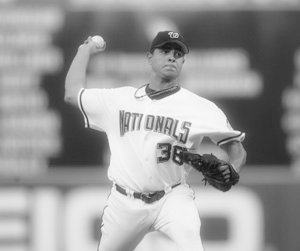 [April 24th] -- Yeah, yeah; I watched the game too. 1-0 lead into the 8th, a three-run homer by Wilson Betemit gave the Braves their first lead, sixteen runners left on base by the Nationals, and Nick Johnson ended it all with a dribbler to Adam LaRoche with two on in the 9th.
[April 24th] -- Yeah, yeah; I watched the game too. 1-0 lead into the 8th, a three-run homer by Wilson Betemit gave the Braves their first lead, sixteen runners left on base by the Nationals, and Nick Johnson ended it all with a dribbler to Adam LaRoche with two on in the 9th.
I got it. They lost. Big deal. Something very special happened last night. Tony Armas pitched a gem of a game, and, at least for the near future, the Nats seem to have solid pitching in the first three spots in the rotation. Armas pitched six innings, allowing just three hits while striking out five batters. His ERA for the season is now 2.70, more than a full run lower than John Patterson and almost five-runs-per-game better than the Nationals' alleged age, Livan Hernandez. If Ryan Drese continues to pitch well, the rotation might not be as bad as we'd once feared.
Armas was brilliant, consistantly hitting 91-93 mph all night. He threw strikes at the knees all night, keeping the Braves' batters behind in the count in almost every at bat. No one has ever questioned his talent or his heart; only his ability to stay healthy. His history says he won't finish the year in one piece. Jump into the way-back machine with me and let's observe Armas' last few years:
It was the last spring training game of 2003. Tony Armas squinted in the Florida sunshine as he leaned in towards catcher Michael Barrett to get his sign. The Mets' Jason Phillips danced off of third base. Armas came set and snapped off a curve ball that caught Ty Wiggington looking. "Strike three -- three outs!" bellowed the umpire. His day done, Armas began to run laps in the outfield, satisfied with both his outing that day and his effort during the spring. In 19 innings, Armas had given up only 3 runs while striking out 21 batters. Finally, the potential that had caused first the Red Sox, and then the Expos to acquire him, had been transformed to success on the field. He was confident that 2003 was going to be his breakout season.
Manager Frank Robinson certainly thought so, and tabbed the then 25 year old as the team's opening day starter against the mighty Atlanta Braves, who had just won their 13th consecutive division title. Armas would face four-time Cy Young award winner Greg Maddux.
It wasn't close.
Orlando Cabrera's two out, two on, two run home run opened the flood gates as the Expos scored four runs in the first inning, allowing Tony Armas to cruise to a 10-2 victory over Atlanta. Armas pitched 6 innings, giving up only 1 run on 5 singles. During the post game interview, Frank Robinson told the press that Armas had "turned the corner," and would finally develop into the dominant pitcher the team had always envisioned he would become.
His second game, against the Mets, wasn't quite as good. He gave up 3 runs in 5 innings in a 3-1 loss to New York. His next start, against the Cubs, was as dominant as the National League had seen that season. In 7 innings, Armas gave up only 3 singles while striking out 11 in a 7-1 pasting of Chicago. Game four was a rematch against the Braves in Montreal. Armas threw another 7 stellar innings, giving up only 3 hits in a no-decision loss to the Braves in 10 innings. His fifth start, against the Reds in Puerto Rico, wasn't nearly as pretty. Although he gave up only 8 hits in 6 innings, 4 of them were home runs (one to current team-mate Jose Guillen) as the Reds beat Armas and the Expos, 7-5. After 5 starts, Armas had a record of 2-1 with a solid .261 ERA. In 31 innings, struck out 23 and walked only 8 batters. He dominated in 4 of his 5 starts.
A dejected Armas boarded the team plane as it warmed it's engines on the tarmac at Marin International Airport in San Juan. He reached his seat and opened the overhead bin and, grabbing his travel bag with his pitching arm, threw it into the bin. He felt a sharp pain shoot through his shoulder. When Armas awoke the next morning in his Montreal apartment, he couldn't lift his arm. It happened again. Armas had torn both his rotor cuff and his labrum. He was done for the season.
The Expos/Nationals' franchise understood the fragile nature of Tony Armas Jr. His father, slugger Tony Armas Sr., missed more than 300 games in his career due to injury. In 1998, the Expos micro-managed their budding star to the point of forbidding him to throw certain pitches for fear of injuring his arm. He was tabbed as the Eastern League's best pitcher the previous season, and the Expos wanted him protected.
It didn't help.
Armas had sprained his elbow during the 2000 off-season, and was held back during the first part of spring training in 2001.
When he was finally allowed to throw hard, he developed tendonitis in his shoulder. Because the arm trouble limited the types of pitches he could throw, batters were waiting on his fastball, and he was hammered hard all season. Armas went 9-14, 4.03 in 2001. He stayed healthy in 2002, and won 12 games for the first time in his career.
Armas began spring training 2004 believing that he was 100% healthy. Frank Robinson wanted Armas to remain on the disabled list and continue to regain his strength, but Armas believed he was ready to pitch again. Frank was right. Halfway through the season, Armas developed a tired arm and was only able to start 16 games, going 2-4, 4.88. He came into the Nationals' initial spring training in 2005 fully healthy for the first time in several years. The team, and all of baseball really, believed that 2005 would be Armas' "breakout" year. That lasted until March 28th, when a pulled groin put the 27 year old on the 15-day disabled list. He rejoined the Nationals in May having missed 31 games. He started 19 games, going 7-7, 4.97. In September, he re-injured his groin and was listed as "day to day." A week later, the team placed him on the 60 day DL and he was lost for the season.
The Nationals weren't interested in re-signing Armas during the winner free-agent signing period. They believed that several teams would take a chance on the talented but oft-injured pitcher, and they just didn't have the payroll to take a chance on him. It was thought that Armas would get a contract that called for $4-6 million per year. He got nothing. Oh, the Rockies were interested, but playing a season in Denver wasn't going to do much to help him get a "real" contract in 2007. He ended up re-signing with the Nationals for about $2.1 million. The Nationals hope that he remains healthy and starts 30 games. Armas hopes he remains healthy and pitches well enough to garner a multi-year free-agent contract next season.
A healthy Tony Armas Jr. could have close to 100 wins at this stage in his career. He has 39. The odds are on him staying healthy in 2006. I mean, it just has to happen sooner or later. What could he do if healthy? 13-9, 3.75 sounds about right. If he has that type of season out of the back of the rotation, the team might just do OK. If he doesn't?
I don't want to even think about it.
The rest of the game was just window dressing for Armas' performance. Sometimes, a loss isn't just a loss. This one showed Nats' fans what a healthy Tony Armas Jr. can do.
I liked what I saw.
NATS LUCKED OUT WITH FRANCISCO PLASENCIA
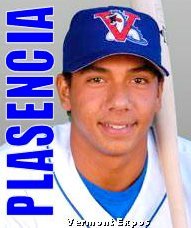 [April 23rd] -- When Francisco Plasencia stepped to the plate for the first time in 2005, the Washington Nationals thought they knew what to expect. Plasencia had amassed 350+ at bats in the Brewers farm system, playing at the team's rookie league affiliate in Ogden Utah as well as spending two seasons in the Arizona League. He hit for a combined .266 with a .344 on base percentage and a .375 slugging average. Plasencia hit just three home runs in those 357 at bats. The Nationals looked at his slight 6'2", 150 pound frame and hoped that their new outfielder could continue to work on his stolen base prowess. A speedy leadoff hitter. Could be. Could be.
[April 23rd] -- When Francisco Plasencia stepped to the plate for the first time in 2005, the Washington Nationals thought they knew what to expect. Plasencia had amassed 350+ at bats in the Brewers farm system, playing at the team's rookie league affiliate in Ogden Utah as well as spending two seasons in the Arizona League. He hit for a combined .266 with a .344 on base percentage and a .375 slugging average. Plasencia hit just three home runs in those 357 at bats. The Nationals looked at his slight 6'2", 150 pound frame and hoped that their new outfielder could continue to work on his stolen base prowess. A speedy leadoff hitter. Could be. Could be.
With his first swing of the season, Plasencia lined a deep ball off the right-center field wall at Lowell's LeLacheur Park and ended up at second base with a stand-up double. He didn't look like a top-of-the-lineup kind of guy. He kinda looked like a power hitter. Could that be possible?
It could. And he was.
Francisco Plasencia was one of the few bright spots on an otherwise moribund Expos team. In just 280 at-bats, he hit .300 with 11 home runs, 16 doubles and 4 triples. He finished the season with a fine .871 OPS. In three short months, Plasencia went from negible afterthought pick-up to a power hitting prospect.
If Plasencia can produce those kind of offensive power numbers with a 150 pound frame, what might he be able to do once his body weight catches up to his 6'2" height? Projected over a 140 game minor league number, his numbers would have looked like this: AVE:300 -- RUNS:86 -- HITS:168 -- 2B:32 -- 3B:8 -- HR:22 -- RBI:108 -- SB:28.
Jim McAllister, a minor league scout familiar with Plasencia, said he was surprised that the Brewers gave up on the young Venezuelan so quickly. "With his frame, what is he, 6'2", 6'3", it has 150 pounds on it at 20. By the time he's 24, he'll be 200 pounds and it'll be all muscle. The Brewers saw his speed and tried to make him a leadoff hitter. They shouldn't have. His bat's going to be a good one."
The "big board" at Nationals Farm Authority project Plasencia to begin the season at low 'A' Savannah, and I think that's accurate. If, however, he continues to hit in 2006 like he did last year, he'll likely be at Potomac by mid-season, and enjoy a cup of coffee with the 'AA' Harrisburg Senators. He'll be only 22 this season and should surface with the big club sometime in 2008.
Sorry, Milwaukee. Francisco Plasencia just might be the "one that got away."
A YEAR LATER, NATS MINOR LEAGUE SYSTEM STILL THIN
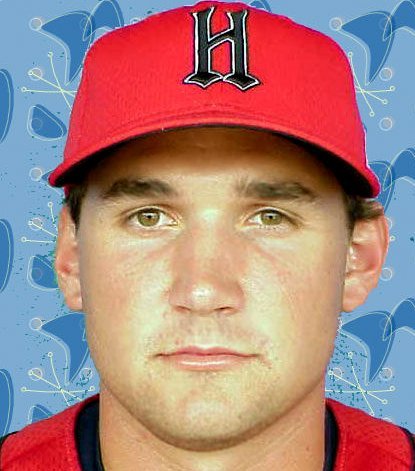 [April 23rd] -- The Washington Nationals, embarking on their second season in D.C., seems to be a "top down" team. The major league roster continues to be too thin to contend in the National League East. But while the Nationals are looking better than they did ten days ago, their isn't any real hope on the horizon. Their minor league system seems bereft of any "cant miss" guys. Instead, you come accross a bunch of career minor leaguers just enjoying the opportunity to wear a baseball jersey one more time.
[April 23rd] -- The Washington Nationals, embarking on their second season in D.C., seems to be a "top down" team. The major league roster continues to be too thin to contend in the National League East. But while the Nationals are looking better than they did ten days ago, their isn't any real hope on the horizon. Their minor league system seems bereft of any "cant miss" guys. Instead, you come accross a bunch of career minor leaguers just enjoying the opportunity to wear a baseball jersey one more time.
What happened? Lots of things. During the 1980s and early 1990s, no major league team produced more quality home grown players than the Expos. Gary Carter. Andre Dawson. Warren Cromartie. Larry Walker. Moises Alou. Rondell White. On and on it went. Their high point came in 1994, when the Expos were leading the NL East with a bunch of career Expos players. Of course, the strike erased their first place standing and, as attendance dropped in the years that followed, those quality players were sold and traded to keep the team afloat. Since then of course, the franchise has suffered from a lack of money and an featured an ownership group who suffered from a lack of caring. They traded all of their stars for prospects who never seemed to pan out. Then, Omar Minaya became the GM of the Montreal Expos.
With the team just a couple of games over .500 in 2002, Minaya believed the team was in a pennant race and traded 3 prospects to the Indians for Bartolo Colon. The Expos ended the year winning 83 games and Colon was gone with the free agent wind. How are those "prospects" doing? #1] Grady Sizemore hit .289-22-81 with 22 steals last season for Cleveland. TSN scouting report: Sizemore is a 5 tool talent who will make several all-star squads during his career. #2] Cliff Lee has become a dominant pitcher, going 18-5, 3.79 in 2005. TSN scouting report: Quality 4 pitch arsenal with heat in the low 90s. Consistent 15 game winner in the bigs. #3] Second baseman Brandon Phillips was considered to have the most potential of the three prospects, but he has yet to make an impact at the major league level. TSN scouting report: Can line the ball all over the field and is developing good power for a middle infielder. Has the tools to be an "elite" infielder. Earlier in the season, Maniya acquired Lou Collier from the Mets for a promising outfielder. #4] Jason Bay, OF, Pirates. Bay was "Rookie of the year" in 2004 and had a tremendous season in 2005, going .306-32-101. TSN scouting report: A quality player who will continue to get better. While he's just under super-star status, he will have a tremendous major league career.
Collier was hitting .252 at Milwaukee when the trade came down. He had spent parts of several seasons with the Brewers, so his ceiling level was well known. He played at Ottawa for the rest of the year and was then cut. He was cut by the Phillies last December and has yet to sign with any club. His TSN scouting report: "A light hitter who has an especially hard time hitting righthanders. A borderline utility player." At the time of the trade, Jason Bay was at AA where he was on pace to hit .294 with 17 homers and 80 rbi's.Why do you trade a player with tremendous potential for a player who has already shown that he doesn't have what it takes to be a regular in the major leagues? Because Omar Minaya thought he needed a utility infilelder for his pennant run. Less than six months later, Collier was cut. Less than 2 years later, Jason Bay was the NL Rookie of the Year. Ouch.
The good news is this happened when the team was still in Montreal. Jim Bowden's major league mistakes haven't permeated the minor leagues yet. the 2005 draft, overall anyway, was pretty good. The system isn't ready to make a difference yet, but it will be.
SORIANO IMPRESSING NATS; IS HE IMPRESSING OTHER TEAMS?
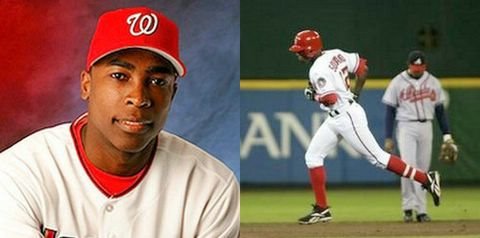 [April 22nd] -- I sat down in my official blogging chair this morning expecting to dedicate the first two paragraphs of today's story to Alfonso Soriano, that come-of-age "team player" who hit his fourth, fifth, and sixth home runs of the young season last night against John Smoltz and some guy with a long name (okay, it was Oscar Villarreal). My heart wants to tell you that Soriano "officially" became a National last night, that he thrust himself out from under Brad Wilkerson and, for the first time, Nats' fans truly understand what this guy is all about, and that Soriano, and the Nationals, and the Nationals' fans, would live happily ever after.
[April 22nd] -- I sat down in my official blogging chair this morning expecting to dedicate the first two paragraphs of today's story to Alfonso Soriano, that come-of-age "team player" who hit his fourth, fifth, and sixth home runs of the young season last night against John Smoltz and some guy with a long name (okay, it was Oscar Villarreal). My heart wants to tell you that Soriano "officially" became a National last night, that he thrust himself out from under Brad Wilkerson and, for the first time, Nats' fans truly understand what this guy is all about, and that Soriano, and the Nationals, and the Nationals' fans, would live happily ever after.
[insert sound of needle being dragged across a record here]
Of course, we all know that isn't true. Alfonso Soriano was traded from a team he loved, lived in a city he adored, had to listen to his new team tell him to his face why he wasn't deserving of the money he was asking, and then was threatened with suspension if he didn't move to a position he'd never played with almost no time to learn how to do it, and is playing in a home ball park that will likely reduce his home run total by 15%.
And he's in the last year of his contract.
And he said that he's going back to the American League after the end of this season.
What's there to get excited about again?
The Nationals are in quite a conundrum, thanks to GM Jim Bowden. Soriano is a hired gun, a one-year wonder, a guy who would have made a difference if his surrounding teammates were good, and needed help to become great. That's not the case in Washington. The Nationals are very below average, and Soriano's presence will only get them close (but not to) 500. At the end of the season, he's gone, off to some American League bandbox, to become part of a team willing to overlook his deficiencies [hey: I'm being polite] at second base. The only thing that will keep Soriano in Washington is a new owner [Lerner?] who is willing to pay much, much more than he's worth to stay in D.C. and play left. How much would it take? Well, he thought he was worth $12.5 million this year, so, what, $15-16 million per year? Maybe more?
The more likely scenario is that the Nationals will play well, but not well enough to make it worthwhile to keep Soriano on the payroll. At some point, probably in the midst of a mid-summer losing streak, Soriano will get traded, probably to an American League team, for prospects, buckets and buckets of prospects.
Keep him? Trade him? I say trade him.
The new owner is going to show fans that he means business, and there is no question that he's going to enter the free-agent market with a wallet full of cash. The new management will be able to replace Soriano's bat without too much trouble, and at a price far less then the team would have to pay to keep him. By trading Soriano, the Nats could in effect receive prospects and the free-agent signee. That's not such a bad deal.
Look, there is no question that Soriano is a special player, and that he would help the Nationals by staying here long-term. But he'll help the Nationals even more by going. Remember all those draft picks the Redskins received by trading the rights to Ricky Williams to New Orleans? Look how Bartolo Colon's trade to the Expos a few years back brought in return several players who today are helping Cleveland mount a serious run at the post season. This team will finish the season in fourth place in the NL East with, or without, Alfonso Soriano. If Marlon Byrd were to play left field for the rest of the year, he'd likely hit .270-12-60 or so, enough keep the team competitive.
I don't know what will happen in the comings weeks and months. I doubt if Jim Bowden would even made a trade that helps this team's future because he's trying so hard to hold on to his job today. But as fun as Alfonso Soriano is to watch, the Nats should begin looking at the "lay of the land," to see who might be in need of a very special player. I'll miss Alfonso Soriano, but a strong future is worth far more than a few isolated special nights during what surely will become a long season.
NATS GETTING BETTER, ONE GAME AT A TIME, BEAT PHILLIES 10-4
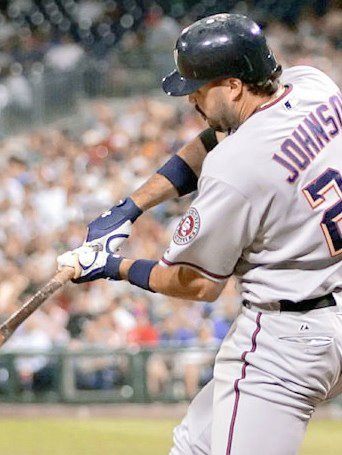 [April 20th] -- When Nick Johnson is on his game, he is, without a doubt, one of the most technically-perfect players in the National League. Everything he does is "by the book." He takes outside pitches the opposite way, balls in the middle of the plate are shot into center field, inside pitches are lifted deep into the right field seats. He walks more, and strikes out less than his peers at first base. His defense prowess is dominant. If he had stayed healthy during his career, there is no way that the Nationals could have afforded to sign him to a multi-year deal.
[April 20th] -- When Nick Johnson is on his game, he is, without a doubt, one of the most technically-perfect players in the National League. Everything he does is "by the book." He takes outside pitches the opposite way, balls in the middle of the plate are shot into center field, inside pitches are lifted deep into the right field seats. He walks more, and strikes out less than his peers at first base. His defense prowess is dominant. If he had stayed healthy during his career, there is no way that the Nationals could have afforded to sign him to a multi-year deal.
Johnson had "one of those games" Thursday night in Philadelphia, going 4-4 with two long home runs and three runs batted in. He scored three runs. Johnson now has five home runs this season, averaging a homer every 10 at-bats, 2 1/2 times higher than his career average. I know that there is a temptation to play Johnson every day, to keep his bat in the lineup 24/7, but please, Frank, don't do it. The only sure way to keep Johnson healthy (if that's possible) would be to rest him often. 125 games would be a doable number. The other 37 games could be ably manned by a combination of Daryle Ward, Matt LeCroy and Robert Fick. I know that 125 games doesn't sound like much, but it's far greater than his career average of 107. Gotta keep the boy healthy.
Alfonso Soriano continues to impress. Days after the trade last fall, I said that Terrmel Sledge and Brad Wilkerson could combine for twice the number of homers that Soriano would hit in Washington. Wrong. Sledge is back in the minor leagues and Brad Wilkerson stands at .200-2-6 with 25 strikeouts in 60 at bats. Soriano went 2-6 with a double, and made three good plays at, near, and on the left field wall. Judging by that smile of his after making those plays, I think he's actually beginning to enjoy playing the outfield.
Billy Traber pitched well in his first major league action since 2003. Look, I know he gave up 3 runs in 5 innings and his ERA stands at 4.76, but I chalk that up to jitters. He gave up only 2 hits in those 5 innings -- it was the 4 walks that cost him. He's always had good control, so I'm not concerned about his wildness. I love the 2 hits in 5 innings, though. That shows he dominated the hitters (when he got the ball over, of course). No question he deserves another chance to start. And another. And another ....
Ryan Zimmerman has fallen into a good game/bad game, good game/bad game routine. Thursday was a good game. He went 2-4 and with two rbi's and a walk. But that's a good thing. The pitchers find a new way to get the kid out (bad game), but he comes back the next night with an adjustment and has a good game.
The Nationals ended this two-part road trip 6-7, an excellent way to begin the season. The 0-3 home record doesn't help, though. The good news is that I seriously doubt the team will play as bad as they did last week again this year. The bad news? They have five months to prove me wrong.
DAY OFF
 [April 20th] -- I'm taking the day off. Now, now .... don't get grumpy, I'm feeling guilty enough about it as it is. It's just that I've learned from last year's mistake, which was to never, ever, ever, miss a day. By late July, in the midst of that terrible losing skein, my brain exploded and I didn't post for almost three weeks. I Don't want that to happen again. And if I'm going to play hooky, the day after the Nats blow a 6-3 lead in the 8th is a good day to do it.
[April 20th] -- I'm taking the day off. Now, now .... don't get grumpy, I'm feeling guilty enough about it as it is. It's just that I've learned from last year's mistake, which was to never, ever, ever, miss a day. By late July, in the midst of that terrible losing skein, my brain exploded and I didn't post for almost three weeks. I Don't want that to happen again. And if I'm going to play hooky, the day after the Nats blow a 6-3 lead in the 8th is a good day to do it.
Hey, I'll be back tomorrow; Basil at Federal Baseball is going to take "the next few days off." I'm just taking a nap; he's sleeping in! (Love ya Basil!)
Actually, I'm going to offer my readers to post "guest columns" here at the Beltway Boys. I'm no better at writing than the next guy, and I'd love to hear what the "next guy" has to say. I'll gladly turn the keys over to anyone who'd like to "sound off." Just leave a comment with your email below and I'll get back to you. Phil, this means you!
BOWDEN, BASES, WERE LOADED ON TUESDAY, AND BOTH GOT SLAMMED
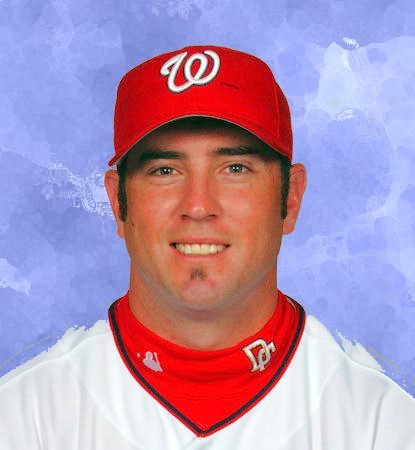 [April 18th] -- Ryan Zimmerman braced his back leg, swung level and drove the fastball deep towards the left-center field wall. Pat Burrell raced backwards, slowing up only when he reached the far edge of the warning track. He raised his glove and made the catch, a foot or so short of a home run. Burrell was standing 344 feet from home plate. Such is life in a band box.
[April 18th] -- Ryan Zimmerman braced his back leg, swung level and drove the fastball deep towards the left-center field wall. Pat Burrell raced backwards, slowing up only when he reached the far edge of the warning track. He raised his glove and made the catch, a foot or so short of a home run. Burrell was standing 344 feet from home plate. Such is life in a band box.
Why, all of a sudden, have the Nationals' bats gotten hot? Law of averages? Small park? Bad pitcher? I suspect it's probably a combination of all three. Regardless, for the first time all year, solid hitting joined quality pitching and top-notch defense to allow the Nationals to flex a little NL East muscle.
How silly is Jim Bowden looking tonight, and I'm not talking about his run-in with the folks from Miami Vice? No I'm talking about Ryan Church, who went 2-4 again, with a grand slam home run and four rbi's. He is playing better defense than Brandon Watson, pummeling the ball in a way Watson never could, and getting on base more often as well. I believed last year that Church was a .280-20-80 kinda guy, and still do.
Ryan Zimmerman had a great game, going 2-5 with three more rbi's. He now has 9 in 14 games, on pace for 104 this year, his .222 batting average not withstanding. He's a kid, a rookie's rookie. He's going to look like Jim Rice one week and Condoleezza Rice the next. Enjoy the good and forget the bad; Zimmerman's the real deal.
Daryle Ward homered and doubled (not too surprising) and played solid defense in right (very surprising). Don't you think that Ward and Matt LeCroy will make a formidable platoon at first base if Nick goes down for any length of time this year? Wow.
Tony Armas continues to pitch well, well .... well enough I guess is a better term.  Six innings, seven hits, three strikouts, and a 3.71 ERA for the year. It looks like the team has two solid starters, which isn't a surprise. What is a surprise is that the two are John Patterson and Armas. That said, Hernandez will come around at some point, giving the Nats three real starting pitchers.
Six innings, seven hits, three strikouts, and a 3.71 ERA for the year. It looks like the team has two solid starters, which isn't a surprise. What is a surprise is that the two are John Patterson and Armas. That said, Hernandez will come around at some point, giving the Nats three real starting pitchers.
The Nationals have now won three in a row and stand at 5-9 for the year, and are just a game and a half out of second place. Ryan Church seems like he is destined to be that "extra" big bat that the team needed so badly against the Mets and Astros.
I don't think Bowden is going to lose his job over the DUI. I think he's going to lose his job because he sent Church down to New Orleans and kept Brandon Watson.
THE WINDS OF CHANGE ARE NIGH
 [April 18th] -- I came out west years ago to work for a small, local, camera company. After being a manager for the ever-growing Ritz Camera chain, I enjoyed the personal relationships that a small company afforded. I was happy and content for six years, until the owner put the business up for sale. At that point, I was in the top 5% in store volume and personal sales. The ownership change wouldn't effect me. That said, every measurable production statistic of mine took a nose-dive during those four months of indecision. Finally, the chain was sold. To Ritz Cameras. Crap.
[April 18th] -- I came out west years ago to work for a small, local, camera company. After being a manager for the ever-growing Ritz Camera chain, I enjoyed the personal relationships that a small company afforded. I was happy and content for six years, until the owner put the business up for sale. At that point, I was in the top 5% in store volume and personal sales. The ownership change wouldn't effect me. That said, every measurable production statistic of mine took a nose-dive during those four months of indecision. Finally, the chain was sold. To Ritz Cameras. Crap.
The point is, some people do well with uncertainty, others don't. I'm not sure that the Washington Nationals we're watching today (players and management both) are producing at a level commensurate with their ability. Some players, like Nick Johnson and Alfonso Soriano, aren't having a problem, others are. I'm not suggesting that the team would be in first place if the new management had been in place since last winter, but the team likely would have been playing at a higher level.
It's probable that new ownership will be announced this week; Friday is the day most are suggesting, and it's just as probable that the Lerner family, recently threatened by MLB for being top heavy in old white men, will become the new owners. Typically, new ownership takes things slow. They take their time, soaking in the atmosphere, learning the "lay of the land," trying not to make any quick and potentially unnecessary changes. That would work in most situations, but not ours. The Lerner's need to hit the ground running, giving hope to both the fans and the players that the "wandering in the desert for 40 years" part of the team's history is over.
Instant stability. Now.
If I were advising the Lerners' as to how to proceed, I would say this: "Make it known immediately that a new day is dawning in Washington, that whatever happened over the past year and a half is now history. Tony Taveres has often said that he has stayed longer in D.C. that he wanted. Fine. Let him go. Give him some flowers. Jim Bowden has to go too. Give him the middle finger. Tell Frank Robinson that his loyalty to the organization is greatly appreciated, let him manage until the end of the year, then bump him up to some big-title, little-responsibility position. Don't get me wrong, I like Frank, but changes have to happen. I would then sign somebody to a long-term deal, showing a willingness to spend money. It doesn't matter who -- Alfonso Soriano -- Jose Guillen -- even John Patterson. Make changes everywhere -- they all don't have to be good; some can be of the 'moving this over there' variety. But the city needs to know that the 'old days' are gone."
Hopefully, this is the last week of uncertainty in Washington. Well, uncertainty in ... baseball ... in Washington. After all, Lerner can't take care of all that George Bush .... Harry Reid ... uncertain...
Forget it.
NATS GO TO CHURCH ON EASTER SUNDAY
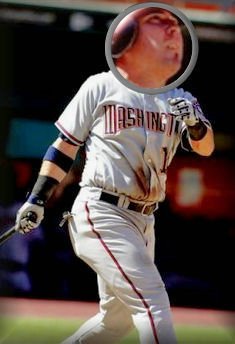 [April 16th] -- How much do you want to bet that Jim Bowden will take the credit for Ryan Church's two homeruns on Sunday? It'll probably sound something like this: "I knew all he needed was to get his head straight, and that going to New Orleans for a couple of weeks did the trick. Perhaps now he'll listen to me."
[April 16th] -- How much do you want to bet that Jim Bowden will take the credit for Ryan Church's two homeruns on Sunday? It'll probably sound something like this: "I knew all he needed was to get his head straight, and that going to New Orleans for a couple of weeks did the trick. Perhaps now he'll listen to me."
Of course, that's a lot of hooey. Church simply started the season in a slump, and that slump continued with the Zephyrs. It also continued his first game back with the Nationals. Slumps come. Slumps go. Jim Bowden had nothing to do with it.
Jim, I'm thinking that Brandon Watson wouldn't have been able to make such a difference in today's game. Jerk.
Now, before we get too excited, let's remember a few facts. First, the Nationals beat a minor league team the last two games. Sure, they'll be good in a few years, but today, they are just a bunch of kids. Second, the Nats managed only 8 hits, for a total of 13 in their last two wins. That's just not enough. Third, Ramon Ortiz continues to pitch, well, not poorly exactly, but certainly not well enough to win on a consistant basis. Ortiz gave up 8 hits and 3 runs in 5 innings, and struck out only one batter. He now has only two strikeouts in 16 innings this year; he's not able to overpower anyone, and that's a bad sign. Third, Ryan Zimmerman is slowly slipping into mediocrity. He's now batting .204 and is striking out once every three at bats. Forth, the mental mistakes keeping happening. Marlon Byrd got picked off of first base. Nick Johnson tried to advance to third on a wild pitch that wasn't very wild, and was easily thrown out. The team isn't making as many errors as they had earlier this spring, but the mental boo-boos just keep on coming.
Royce Clayton joined the walking wounded after being hit by a Sergio Mitre fastball, he like half the team (or so it seems) is listed as day-to-day. There was some good news. Chad Cordero overwhelmed the Marlins in the 9th; he made sure there was no repeat of last night's "almost" blown save.
The Nats have a day off tomorrow before playing the Phillies in Philadelphia on Tuesday. They are now 4-9, but can claim not a single "decisive" win (the 10-5 win against the Mets came in extra innings), while many of the losses have been lopsided. The Nationals have two starters (Patterson and Armas Jr.) who have pitched effectively, and only two starting hitters above .240. The two wins this weekend were nice, but we're back in the big leagues this coming week.
The offense might suddenly become potent and lead the Nats to wins over the Phillies and the Braves.
But I wouldn't count on it.
NATS NEED GREAT PLAY TO BEAT FISH, 2-1
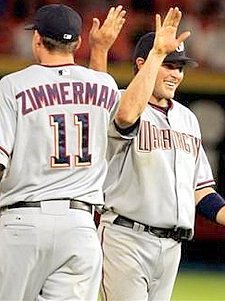 [April 15th] -- What's the difference between a win and a loss these days? About two inches.
[April 15th] -- What's the difference between a win and a loss these days? About two inches.
I was very uncomfortable heading into the bottom of the 9th inning because Chad Cordero was going to try to close out the game for the Nationals. See, this isn't the Chad Cordero of last year, the 47 save version. This is Chad Cordero of this year, who has given up a home run in each of his three outings thus far. I wasn't comfortable after the first out, and I wasn't comfortable after the second out. Then came the two walks. Now I was scared. And when Josh Willingham lined that ball towards right-center field, I was downright apoplectic. Suddenly, out of nowhere, a leaping Brendan Harris snatched the ball out of the air while still at it's apex, and returned to Earth with the Nationals' third win of the season. Had Jose Vidro been playing, the game would have been tied. He is two inches shorter, and not nearly as athletic; the ball would have found it's way to the outfield allowing the tying run to score, and who knows, it was hit hard enough to perhaps reach the wall, allowing the runner at first, running with two out, to make it home with the game's winning run.
Whew.
John Patterson pitched his first "lights out" game of the season, allaying the fears, at least temporarily, that last year was "lighting in the bottle" for the lanky right-hander. He pitched eight innings, allowing only three hits and one run. He struck out thirteen batters, including five in a row early in the game. With the exception of back-to-back doubles in the fifth inning, he was un-hittable. His motion looked much smoother than in his previous starts, and his breaking ball was "falling off the table" as it reached home plate.
Don't get to excited about this win. The offense produced only five hits, enough to win one game in perhaps fifteen. And while Patterson was "lights out," closer Chad Cordero was "light," at least compared to last year's effort. Cordero has to rely on location to get batters out, and he's been throwing too many balls in the middle of the plate this season. Sure, it's great that we won, but we almost didn't.
Two inches, fellow Nat fans. Two inches. That's just too close for comfort.
DRESE ON DL, GUILLEN DAY-TO-DAY, VIDRO'S HAMSTRINGS CAUSING PROBLEMS. OH, AND THE NATS LOST
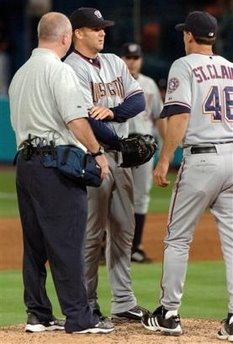 [April 15th] -- The Washington Nationals looked great on Friday night. For about two innings. Then, "same old-same old" came back and bit them in the butt.
[April 15th] -- The Washington Nationals looked great on Friday night. For about two innings. Then, "same old-same old" came back and bit them in the butt.
How does 2-9 grab you?
The Nats fashioned a nice start to Friday night's game against Dontrelle Willis & the Florida Marlins. After two innings, the boys had scored two runs on six hits. They got just three more hits, and one run, over the next seven frames, losing to the Marlins 5-3.
Now, on to the bad news (you know things are looking bleak when the good news was the team's 9th loss of the season). Ryan Drese left in the 5th inning after experiencing pain in his recently repaired right elbow. He was immediately placed on the 15 day disabled list (you know things are bad when a player is DL'ed before the game is over). Move over, Pedro Astacio. Make room for Ryan.
Jose Guillen strained some part of his body that wasn't hurting earlier in the day (I think there was only one of two of them left) and is day to day. He was replaced by Marlon Byrd, who has a neck injury following a run in with an Astro player last weekend. Jose Vidro's hamstrings have been giving him problems and left the game early too. How bad? I don't want to know.
What the heck is going on around here?
Any ideas on why Matt LeCroy started the game behind the plate, this coming less than 24 hours after manager Frank Robinson said that Jim Bowden's decision to send Wiki Gonzalez to New Orleans would force Brian Schneider to play "almost every day?" Maybe Frank is doing a little "in your face" with his boss? I think Frank is saying, okay, buddy, you want LeCroy to catch, FINE!, you've got it. Past Ball. Horrible throw to second on a stolen base attempt. Yep. I think Frank made his point.
Now, I'm a Ryan Church fan, but my gosh, he looked terrible, going 0-5 with three strikeouts. I can forgive the at bats against Dontrelle Willis, but his swing-and-a-miss to end the game against Joe Borowski was downright horrid. Joe Borowski???? C'mon Ryan.
The Washington Nationals are slowly becoming the New Orleans Zephyrs, or at least a major league version of that minor league team. A thin team is becoming thinner. A bad team is becoming badder. A long season is becoming longer.
Where is Robert Fick when you need him???
GONE FOR THE DAY
Be back this evening.
NATS BEGINNING TO SHOW "TRUE COLORS"
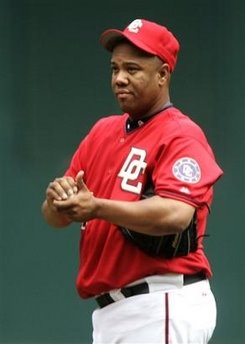 [April 13th] -- Who was pitching this afternoon .... Livan Hernandez or Cuba Gooding Jr? From this photograph, I'd say it was Gooding. Come to think about it, the stat sheet shows about the same thing.
[April 13th] -- Who was pitching this afternoon .... Livan Hernandez or Cuba Gooding Jr? From this photograph, I'd say it was Gooding. Come to think about it, the stat sheet shows about the same thing.
I guess that horrible spring training record in fact was indicative of the caliber of this team. We tried to poo-poo the 9-23 record, but we can't any more; the winning percentage 10 games into the regular season is about the same as that disastrous spring effort. This is going to be a long season. The question is, what will the team do about it?
My recommendation would be, assuming the team continues down this poor-play path, to blow up the team and begin anew. There isn't enough talent in the minor leagues to make an immediate difference, and the majority of the players who could eventually help the team are at class 'A' Potomac and 'AA' Harrisburg. Those guys will be part of the big club about the time the new stadium opens.
My guess is that Alfonso Soriano will be traded before the all-star break (gee, that's going out on a limb, isn't it??). Nick Johnson and Brian Schneider, just signed to long term deals, aren't going anywhere. Jose Vidro, with several years remaining on a long term deal, is here to stay as well. Zimmerman is ensconced at third. That leaves Cristian Guzman, Brandon Watson and Jose Guillen. The Nats would love to get rid of their shortstop, but no one wants him. Watson will be likely be back in the minors in the coming days and weeks. Jose Guillen is an unknown. He said he won't negotiate during the season, and team president Tony Tavares has said that he's ending negotiations with Guillen until the new owner is on board. Livan Hernandez and John Patterson will be around for a long time, and the back of the rotation, Ramon Ortiz, Tony Armas Jr., Pedro Astacio and Ryan Drese, are all on one-year contracts, and it's doubtful that any of them will be back next year (though Armas might if he has a good year).
So, by blowing up the team, we'll lose one guy -- Soriano. The rest of them are either tethered to the team or so bad that no one else wants them.
I guess we can't blow up the team after all. We just don't have enough dynamite to do it.
*Sigh*
NOTHING TO SMILE ABOUT [AGAIN]
 [April 13th] -- Look, I'm a "glass is half full" kind of guy; always have been and always will be. But I've got to tell you, I spent two and a half hours watching the game tonight and I couldn't even find the darn glass.
[April 13th] -- Look, I'm a "glass is half full" kind of guy; always have been and always will be. But I've got to tell you, I spent two and a half hours watching the game tonight and I couldn't even find the darn glass.
Nine games into the 2005 season, the Washington Nationals were 5-4 before playing their first game at RFK, a win against the Arizona Diamondbacks that featured a long home run by Vinny Castilla. Everywhere we looked, we saw promise and hope. Nine games into the 2006 season, the Nationals are 2-7, and could easily be 0-9 if they hadn't caught Billy Wagner and Roy Oswalt on bad days. And with only a few minor exceptions, individual players are playing up to their level of ability. Who is going to get hot and help the team? Brandon Watson is playing terribly, but we all expected that. Jose Guillen is cold but, based on his current physical limitations, no one was looking for a hot start. Where does the extra offense, the better pitching, going to come from?
Nowhere.
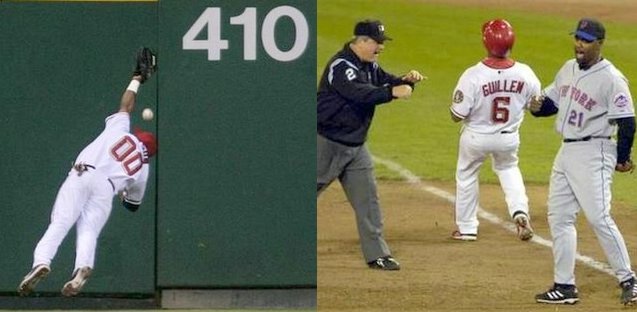 I'm afraid that while the Nationals aren't playing up to their potential, they're pretty darn close.
I'm afraid that while the Nationals aren't playing up to their potential, they're pretty darn close.
The Nationals are getting "dinked" to death. They aren't giving up 10 runs in an inning. They give up one in the third, another in the fourth, two in the 7th and one in the 8th. Suddenly, you look up at the scoreboard and the team is down 5-1 and that, as they say, is that.
The Mets won on Wednesday 3-1, beating the Nationals with their dinking stick. Pedro Martinez pitched well enough, but again, he didn't win; the Nationals lost. Jose Vidro continued his hot hitting with a long homer to right, but one home run a game just isn't going to cut it. Did RFK beat the Nationals? Well, I counted at least four, perhaps five balls that might have been home runs in most other parks. The Nationals loaded the bases with no one out, only to have Jose Vidro strikeout and Jose Guillen ground into a double play to end the threat. The season has been one of bad timing, bad calls, bad judgment and, generally, just plain bad.
The team has no electricity, and as a result, the fans are suffering from a power outage. 29,000+ fans filled 64% of RFK's seats last night.
 They reminded me of the fans in the old "Tom Slick" cartoons that I watched on Saturday mornings when I was a kid. While Tom zoomed around the race track to beat the bad guys, the fans in the seats would join together in a very monotone "yay." Nats' fans keep waiting for something to cheer about, but eighteen innings later, there have been only two swings, two home runs, to excite them.
They reminded me of the fans in the old "Tom Slick" cartoons that I watched on Saturday mornings when I was a kid. While Tom zoomed around the race track to beat the bad guys, the fans in the seats would join together in a very monotone "yay." Nats' fans keep waiting for something to cheer about, but eighteen innings later, there have been only two swings, two home runs, to excite them.
Eight hits in eighteen innings. Yay.
The Nationals have one more chance against the Mets, a day game on Thursday. Livan will try to give the Nats' fans something to cheer about when he takes the mound against Victor Zambrano. Sooner or later, the "bad" karma, or whatever it is that's sinking the guys, has to lift. And these dark days will be forgotten.
At least, I hope so.
BAD DAY AT RFK
 [April 11th] -- Have your finger ready. The time is getting close.
[April 11th] -- Have your finger ready. The time is getting close.
It was a bad day in Washington; the game was just part of the problem. It was a beautifully warm spring day in Washington. Everything should have been perfect. but it wasn't. RFK was almost full. The fans sort-of made noise and and third base stands maybe bounced. A little. The Vice President, not the most important man in the free world, threw out the first pitch. There was the opening day pomp and circumstance that accompanies opening day, but less than we've seen here in years past, and about what you'd expect to find in Detroit or Atlanta.
Washington D.C. isn't Detroit or Atlanta.
There was a "ehh" feel to the day. It was nice, but not nice enough.
Blah blah blah. Blah.
It's becoming a well choreographed play; get behind early and often, attempt a comeback that is too little and too late, then allow the opposition to end the game by pushing the team's face in the toilet and flushing. The rap against Ramon Ortiz has always been "that inning."
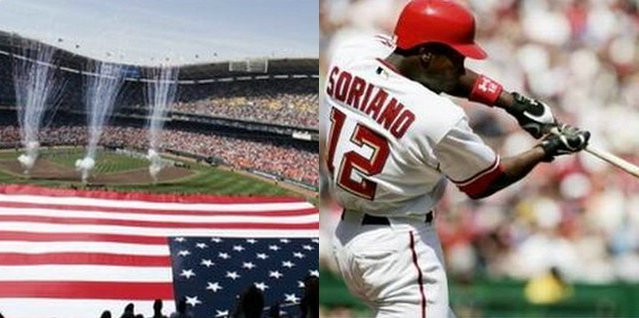 Take away "that inning," and he's a stud. Ortiz cruised until the 4th, when he gave up four runs over the next two innings. Felix Rodriguez gave up a Bonds-esque homerun in the 9th that bounced off the upper deck facade. Final score: 7-1.
Take away "that inning," and he's a stud. Ortiz cruised until the 4th, when he gave up four runs over the next two innings. Felix Rodriguez gave up a Bonds-esque homerun in the 9th that bounced off the upper deck facade. Final score: 7-1.
Not even close. Again.
Offensively, the team had only two hits until Alfonso Soriano smashed his long homer to left in the 7th. They ended with only those three hits for the game. It's pretty sad when you can sum up nine innings of team offense in one short sentence.
Is Brian Bannister so good that he can hold the Nationals to six hits in twelve innings this past week with a .105 batting average against? I don't know. He hasn't pitched against anyone else. My guess is, though, that most pitchers don't come into the league from 'AAA' pitching like Bert Blyleven.
The Nationals are now 2-6 and face Pedro Martinez tomorrow night. When do we start to worry? When do we push that panic button? I'd say soon. Think about this for a moment: The entire starting eight are pretty much playing up to their capability (Brian Schneider wasn't early on but is now). Livan and John Patterson aren't pitching particularly well, how much of a difference would they make when they only pitch forty percent of the team's games?
40,530 saw opening day. The Washington Senators, who averaged 9,000 or so during the mid to late 1960's, had little trouble filling RFK on opening day. Does that worry you?
That panic button is looking bigger and redder each passing day.
IF IT AINT IN D.C., IT ISN'T OPENING DAY
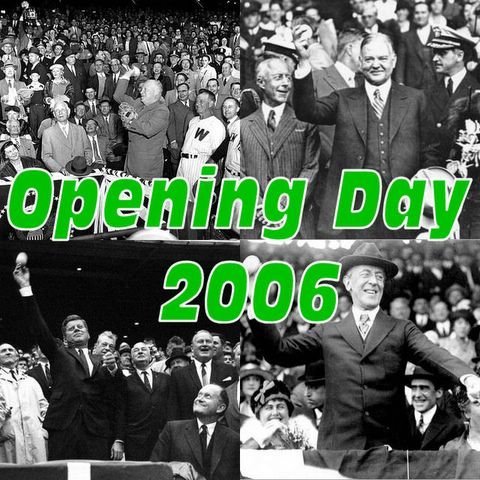 [April 11th] -- What happened in New York last week wasn't "Opening Day." It was merely the first game of the season. For those of us old enough to remember (and young enough to not have forgotten), opening day was always here in Washington, with the president throwing out the first pitch, in front of the season's only capacity crowd.
[April 11th] -- What happened in New York last week wasn't "Opening Day." It was merely the first game of the season. For those of us old enough to remember (and young enough to not have forgotten), opening day was always here in Washington, with the president throwing out the first pitch, in front of the season's only capacity crowd.
I only attended one opening day, in 1971, the last season the Senators would play in D.C. I sat in the very first row in the upper deck in right center field -- I loved the seats.
1971 was a year of great change for the Senators. Bob Short had begun the dismantling of the team that off season with an eight player trade with the Detroit Tigers. We just thought it was bad deal. Short traded his starting shortstop Eddie Brinkman, starting 3rd baseman Aurelio Rodriguez, starting pitchers Joe Coleman and Jim Hannan to Detroit for Denny Mclain, Don Wert, Norm McRae and Elliot Maddux. McLain, who won the Cy Young award in 1968 and shared it in 1969 with Baltimore's Mike Cuellar, had a tough 1970, suffering through an injury, a fight with a sports writer, and a suspension by Bowie Kuhn. It was hoped that McLain would anchor the Senators' pitching staff. I was disappointed when Dick Bosman was announced as the game's starter. I shouldn't have been; McLain went 10-22 that year.
No one gave the Senators much of a chance to win the game. They were playing the Oakland Athletics, champions of the AL Western Divison. Pitching for them was soon to be all-star Vida Blue. I didn't care. The red, white and blue bunting combined with the 45,000 frenzied fans created an atmosphere that made the game almost unimportant. With my binoculars, I was able to pick out many of the "famous faces" in the crowd. There was Warner Wolf in the pressbox. Gordon Peterson from Channel 9 was enjoying the game in one of the mezzanine seats. Columnist Jack Anderson. Washington Senator Scoop Jackson. Shirley Povich and his son Maury. They were all there. Soon, however, that first 'pop' of a ball hitting the catcher's glove, that first "sttriiiiike" call by the umpire, had my mind back between the lines. The game was on. The Senators won that last opening game 8-0, with Dick Bosman besting Vida Blue. Blue would go on to post a 24-8, 1.82 record that year. Bosman went 12-16, 3.33.
I hope that who ever sits in that same seat this afternoon will enjoy this opening game as much as I enjoyed mine. Oh, a few things have changed since then. The highest paid player on the field that day was Frank Howard, who had just signed a $120,000 contract. The ticket cost me $3.50. Parking was 75 cents. A hot dog and a coke totaled $1.35. But, somethings have remained the same. When Frank Howard jogged to left field that April afternoon, he was wearing a red New Era cap with a curly 'W' embroidered on the front of the cap, the same design as the one worn by Alfonso Soriano thirty-five years later.
Oh, and Frank Howard couldn't field worth a darn either.
Enjoy the game.
WARD'S EXTRA INNING BLAST GOES FOR NAUGHT AS NATS FALL 5-4
 [April 10th] -- We've spent the first week of the season complaining about almost every facet of Brandon Watson's game. He's fast but he's been thrown out every time he's tried to steal, and got picked off first as a bonus. He makes good contact, but that doesn't mean much when seemingly every ball is popped out into short left field. Heck, I didn't much like his #00. But we never said much about his arm because we'd never seen it in action.
[April 10th] -- We've spent the first week of the season complaining about almost every facet of Brandon Watson's game. He's fast but he's been thrown out every time he's tried to steal, and got picked off first as a bonus. He makes good contact, but that doesn't mean much when seemingly every ball is popped out into short left field. Heck, I didn't much like his #00. But we never said much about his arm because we'd never seen it in action.
After today's game, I guess it's fair to say that we're still waiting for that first "real" throw.
Brandon Watson's 12th inning throw home from deep short / shallow center had so little on it that Astros' broadcaster mused that the ball was thrown so high that it would have hit the roof had it been closed.
So, now we have a center fielder that can't throw either.
Frank Robinson said that he felt the team needed another week of spring training a day or two before the season started. He was right. Mental mistakes keep hurting the Nationals. With Ryan Zimmerman on 1st and Royce Clayton at the plate, Eddie Rodriguez (subbing for the suspended Robinson), called for a hit-and-run. Zimmerman took off as planned, but Clayton missed the sign. Ryan was out and second, and Clayton struck out to end the inning.
John Patterson has been billed as the next great pitcher in the National League, something I have agreed with many times over the past year. In his second start, he was "okay," pitching well enough for a guy in the back of the rotation, but certainly not like an the ace he portends to be. In six innings, Patterson gave up three runs on five hits, striking out four. He gave up two solo home runs early in the game.
Yet again, the Nats got behind early, tied the game late in the contest, only to lose in the end. It's a pattern that doesn't bode well for the Nationals' chances this year.
- Ryan Zimmerman continues to climb out of that embarrassing hole he dug late last week. He went 2-5 to raise his average to .259, but more importantly, didn't strike out. He made another solid play in the field
- Daryle Ward was brought north with the understanding that he would be the odd-man out when Robert Fick comes off of the disabled list later this month. But after pinch-hitting a long double and a home run on successive days, he will be difficult to cut loose.
- Jose Vidro continues to show what he can do when healthy, going 3-5, raising his average to 406.
- Brian Schneider looks like he isn't going to win the Cristian Guzman "bad start" award after all, getting two hits for the second game in a row.
So, the Nationals limp home with a 2-5 record. It could be worse; they could just as easily be 0-7. Last season, they were 5-4 heading into their home opener. Baseball is about the "long haul;" nine or ten game stretches don't mean much. But this Nationals' team has showed that, while they have some talent, it isn't enough to keep the team in most games on most nights. Don't get me wrong, I love this team as much as last year's, maybe more. But unless we get all those back-end pitchers to have Esteban Loiaza type comeback years, we might be looking at a 70 win season.
I hope I'm wrong.
BYRD HOMERS, FOLLOWED BY 2 1/2 HOURS OF "SAME OLD, SAME OLD"
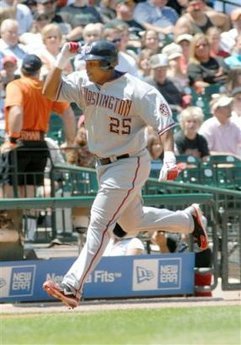 [April 10th] -- Saturday was the exception. Sunday was the rule.
[April 10th] -- Saturday was the exception. Sunday was the rule.
- After mounting one of those "once every blue moon" comebacks on Saturday, the Nationals reverted to their pattern of getting behind early (save Marlon Byrd's early-game reprieve), scoring some runs to make the game close, then allowing a bad inning to put the game out of reach. It's late, so a few superficial thoughts about the game:
1. Ryan Drese pitched a good game, and without the errors, it would have been a great game. [4 innings, 5 hits, 3 strikeouts, 4 walks]
2. Royce Clayton played good cop / bad cop all by himself. A bad throw opened the floodgates that allowed three earned runs to score. He also got 3 hits to up his batting average to .250. Milo Hamilton, broadcasting the game for the Astros, said of Clayton, "Now there's the Royce we all know and love." Jerk.
3. Ryan Zimmerman didn't get any hits, but he did walk two more times, showing that he's calmed down at the plate after that 7 for 7 whiff deal two games ago. Defensively, he turned in another gem. Willie Tavares, a speedster if ever there was one, bunted the ball towards third. Before the ball slowed down, Zimmerman, by now past Ryan Drese, snagged the ball and threw Tavares out by several steps. Wow. Again, Milo Hamilton took offense to Zimmerman being compared to Brooks Robinson, saying that was an afront to Brooksie, adding, "Come see me in a decade or so and I'll let you know what I think." Jerk.
4. I like Alfonso Soriano, his error not withstanding. Soriano is a singularly special player, a talent that this franchise hasn't seen since that wild-swinging right fielder, oh, what was his name, Blad, Clad, Vlad ... something like that. How can a man so slim, with a frame so slight, with an ego so frail, with a bat so heavy, electrically charge a baseball with such a combination of verticity and velocity?
So, the Nationals are now 2-4, and if you take away Zimmerman's improbable 9th inning home run against Billy Wagner and last night's comeback, and the Nats could just as easily be 0-6.
Yuck.
There isn't such a thing as a "must win" in April, but the Nats don't want to come home with their heads hung low and their winning percentage in the range of the Mendoza line. John Patterson goes against "some guy" on Monday -- a sure win if there is such a thing in baseball.
Now, the really cool thing: I now can watch the Nats on my computer, and I take my laptop to all my classes -- afternoon contest + ECON 202 = little chance I'll be taking notes.
GREAT GAME, GREAT WIN, BUT ....
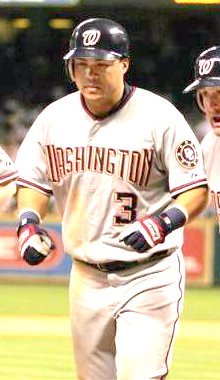 [April 8th] -- Where do I begin.
[April 8th] -- Where do I begin.
Five runs in the first inning. I mean, five runs in the first inning! When you give a guy like Roy Oswalt a five run lead, you might as well shower and head back to the hotel, because Oswalt just doesn't blow big leads.
Well, yes he does.
Two things are becoming clear about the 2006 version of the Washington Nationals. One, they aren't very good and are going to be down early in most of their games, and two, they have a feisty streak that allows them to claw their way back into many of those games. It may not be a winning summer, but it most certainly will be entertaining.
Alfonso Soriano is beginning to win me over. He continues to make the routine plays in left and occasionally makes a difficult one or two. His home run in the second inning was impressive, but his double in the seventh was downright amazing. He drove an 0-2 pitch to the wall, difficult to do when you're trying to protect the plate, just trying to make contact. Jose Vidro continues to impress as well, hitting a long three run home run in the 8th to seal the win for Washington (The Nationals have now hit a 3-run homer in three straight games -- they didn't hit their first one last year until the end of May).
After looking like a 21 year old the last two games, Ryan Zimmerman is again showing why he's a serious candidate for NL rookie of the year. After striking out seven times in a row, after never even coming close to hitting the ball, Zimmerman made adjustments Saturday. After falling behind 0-2, he went the other way and stroked a single to right field. When a player is hitting off his front foot (like Zim has been), hitting to the opposite field helps keep his weight back. Ryan listened to Mitchell Page, and followed his instructions. He got two hits and drove in a run, showing that he's back.
Brandon Watson is definitely not back. He got another hit, sure, but was thrown out trying to steal third base. That's two hits in the last two games for Watson, and both times, he was erased from the base paths (caught stealing and picked off first last night). A single every night just isn't enough for the kid to keep his job, even when he doesn't get picked off. Unless something dramatic happens, I don't think he'll be around come mid May.
Brian Schneider looked good (thank goodness). Coming in to Saturday's game, Schneider was a very bad 0-13. How bad? Not a single batted ball had reached the outfield. He got two hits and seems to have regained his stroke.
Livan won the game, but really, he shouldn't have. In six innings, Hernandez gave up twelve hits and walked one. His ERA is now 5.25.
Hey, they won, and count on them to keep coming back like they have against pitchers like Roy Oswalt and Pedro Martinez. The reality is that our best pitcher allowed the Nats to be down five runs after just one inning. For the team to win, it's going to have to be the result of solid defense, consistent pitching and timely hitting. I haven't seen any of them so far this year.
Today, Andy Petitt goes against Ryan Drese. We really, really need Drese to pitch well. Someone needs to anchor the back of the rotation; it might as well be Drese. Right?
Go Nats.
NATS LOSE 6-1 TO FALL TO 1-3
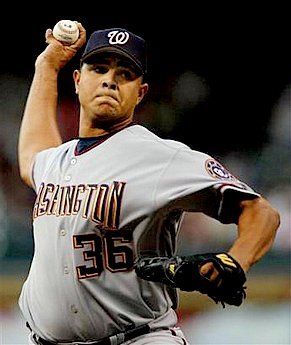 [April 7th] -- You just get that feeling, don't you? As badly as we want the Nationals to do well this year, as much as we've tried to un-earth every conceivable scenario where they might make another run to 81, the Nats look lost as they continue to lose.
[April 7th] -- You just get that feeling, don't you? As badly as we want the Nationals to do well this year, as much as we've tried to un-earth every conceivable scenario where they might make another run to 81, the Nats look lost as they continue to lose.
I'm not saying that the boys aren't doing their best; they are. And that's the problem. The Nationals are like a little economy car whose only hope of reaching interstate speed is to have every engine part finely tuned and working in unison. If one piston is mis-firing, if one tire is a little bald, they'll never get above 50 mph. The Astros (like many other teams) are more like a luxury car, built with top-of-the-line parts that'll cruise down the interstate at 75 mph regardless of how many parts are out of tune.
Right now, Brandon Watson and Brian Schneider are killing the Nationals. Add Ryan Zimmerman's sudden problem with strikeouts (seven in a row at one point), and the remaining players just aren't strong enough to carry the load. If Nick Johnson was Carlos Delgado, if Royce Clayton was Miguel Tejada, than the "one swing" principle would allow the team to cheat out enough wins to end the season with a respectable record. But these Nats don't have those kind of players.
It's not time to get worried. Yet. The Phillies, with more stars and $35 million more in payroll, have started the season 0-4. But it's going to get worse before it gets better. After facing Tom Glavine and Pedro Martinez, the Nationals will go up against Roy Oswalt and Andy Petite this weekend. Six games, four star pitchers.
Tony Armas pitched very well, giving up two earned runs in five innings while striking out three. Jason Bergman looked out of sync, and Gary Majewski looked lost. And what of poor Alfonso Soriano? He hit a ball half way up Tal's Hill in the deepest part of centerfield, only to be caught by Willie Taveras. And we thought RFK would rob him of his power.
NATS NOTES: Jose Vidro continues to impress, hitting a homer for the Nats' only run of the game ..... Ryan Zimmerman looked horrible striking out (three times) -- the worst I've ever seen a major league player look swinging a bat ..... Royce Clayton made a great defensive play, diving to his left to come up with the ball and throw the runner out ..... Does Nick Johnson look slower this year? He b-a-r-e-l-y made to second on a ball hit to the wall in right center field ..... Brandon Watson got his second hit of the season and promptly got picked off of first by Brandon Bracke ..... Preston Wilson didn't look like the 'old' outfielder the Nationals traded for last summer .... Jose Guillen got hit again, the third time in three days. X-rays were negative and he is day-to-day.
NATS COME BACK BID FALLS SHORT, LOSE TO METS 10-5
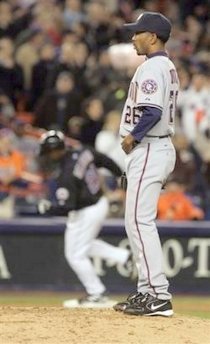 [April 6th] -- I have two tests on Friday, so my time will be better spent studying rather than ranting about Thursday's game. I'll leave that to my "brethren" in the Nat-o-sphere. Some observations, however:
[April 6th] -- I have two tests on Friday, so my time will be better spent studying rather than ranting about Thursday's game. I'll leave that to my "brethren" in the Nat-o-sphere. Some observations, however:
- Ramon Ortiz is likely to be the same pitcher he was in Cincinnati last year, a guy who gives up five runs per game while allowing a ball or two to reach the upper deck.
The Brandon Watson experiment isn't going to work. Watson went 0-5, looking very uncomfortable in the batter's box as he continues to hit fly ball outs. That said, Church went 0-4 in his New Orleans debut -- not exactly a promotional bell-ringing performance.
Brian Schneider is the 9th best hitter in the lineup right now.
- When you score five runs against Pedro Martinez, you HAVE to win the game
- How is it the Mets hit six Nationals during the season before finally getting a warning?
- Ryan Zimmerman is mortal, striking out four times
- Ever ball hit to left field is going to be an adventure .... all season long
- Nick Johnson is coming out of his slump
The Nats come out of New York at 1-2, about what I expected. They begin a four game series against the defending NL Champion Houston Astros on Friday, who are 2-1 so far this season.
Wish me luck on the tests. Talk to you Friday night.









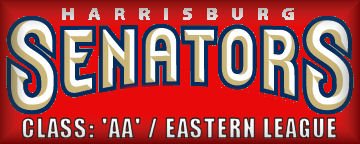
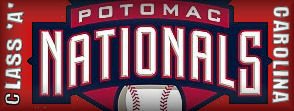

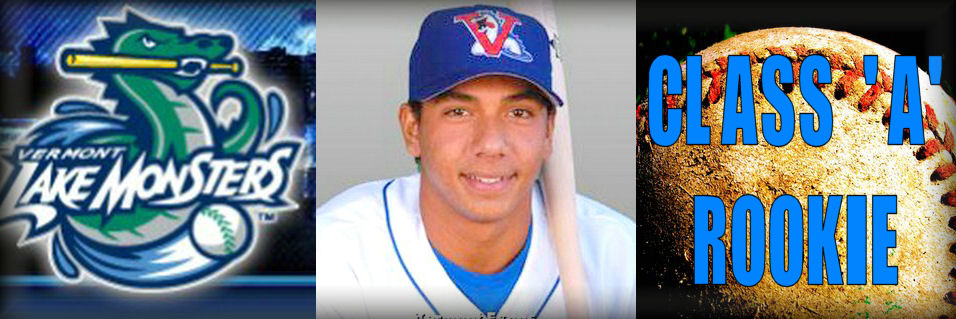















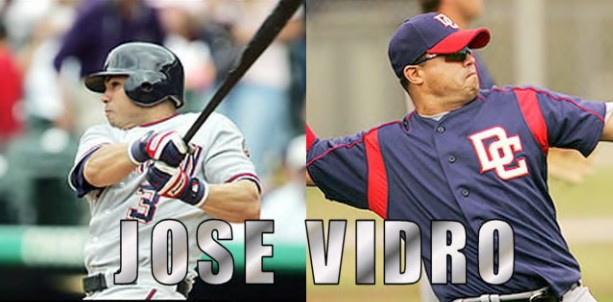




















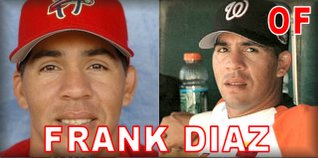

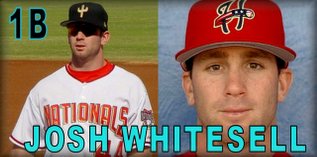
 3) 1926 (road) --- 4) 1936-'37, 1948-'51
3) 1926 (road) --- 4) 1936-'37, 1948-'51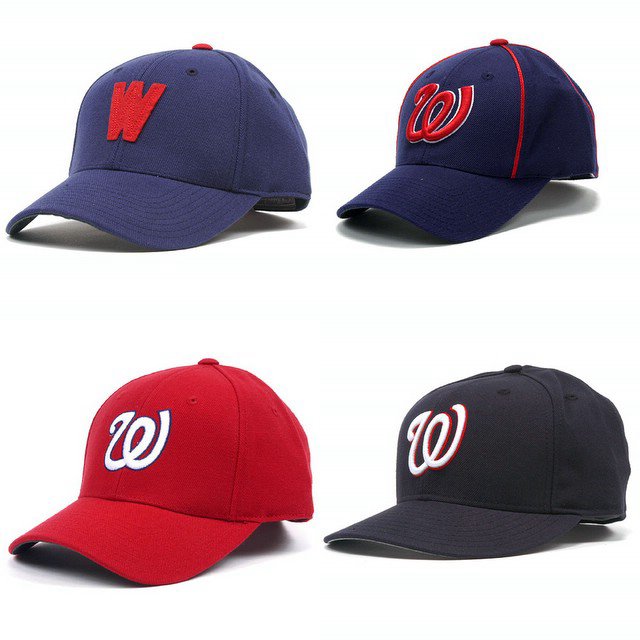 3) 1968 - '71, and 2005 (home) --- 4) 2005 (road)
3) 1968 - '71, and 2005 (home) --- 4) 2005 (road) Buddy Meyer --- Walter Johnson
Buddy Meyer --- Walter Johnson Ed Yost --- Muddy Ruel
Ed Yost --- Muddy Ruel Roger Peckinpaugh --- Joe Cronin
Roger Peckinpaugh --- Joe Cronin Del Unser --- Darold Knowles
Del Unser --- Darold Knowles Ed Stroud - Mike Epstein
Ed Stroud - Mike Epstein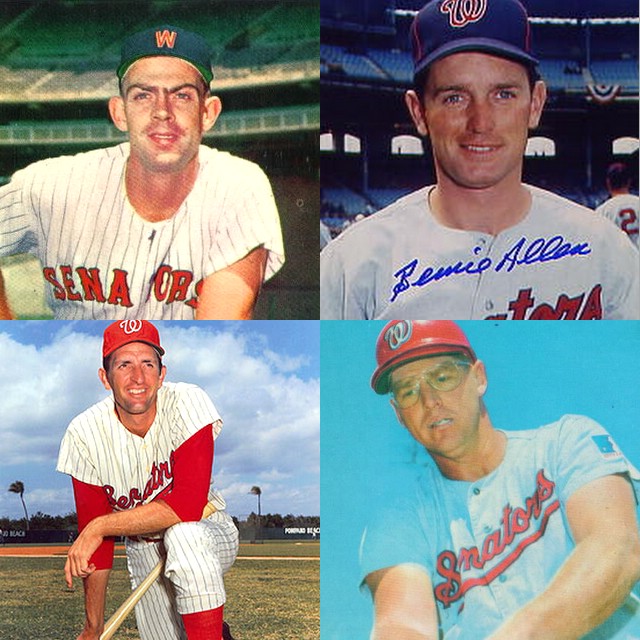 3)1968 -- 4)1969 - 1971
3)1968 -- 4)1969 - 1971